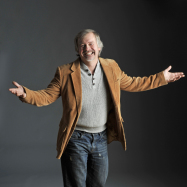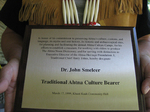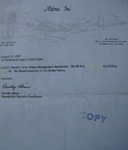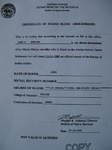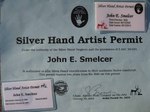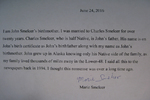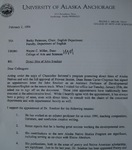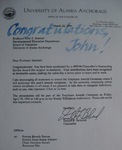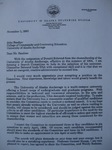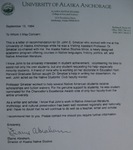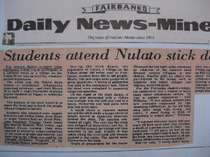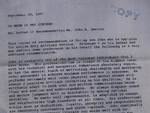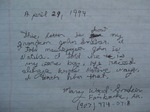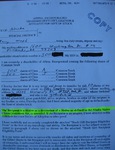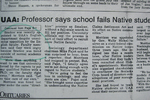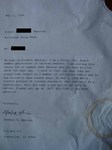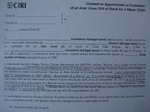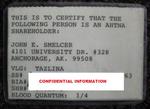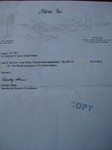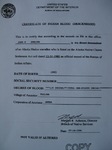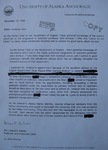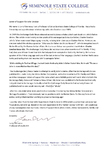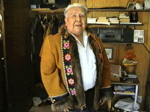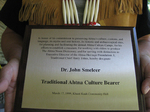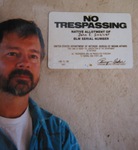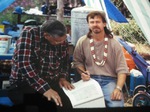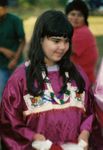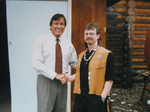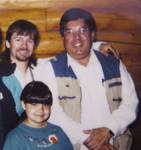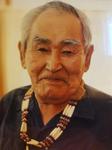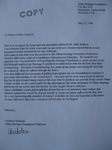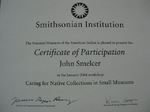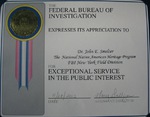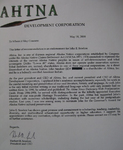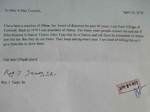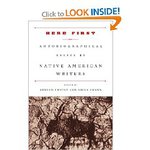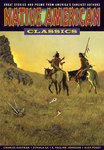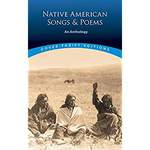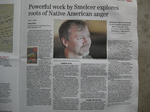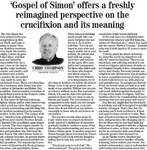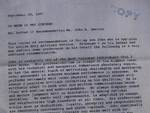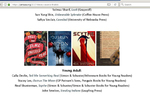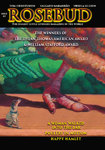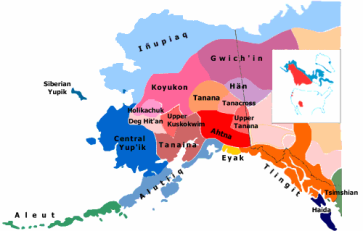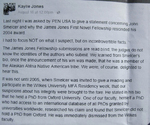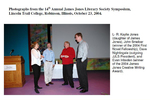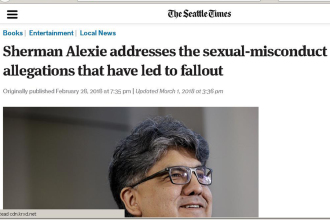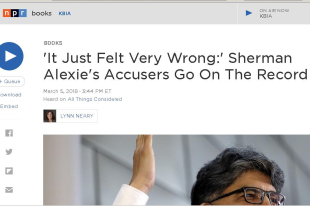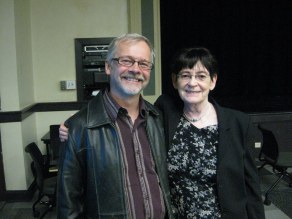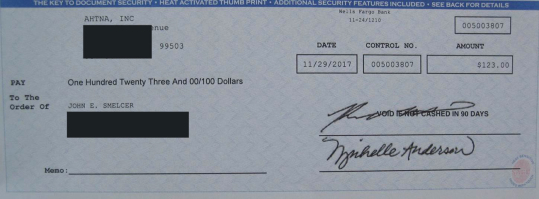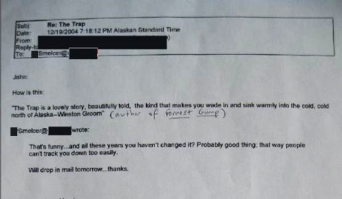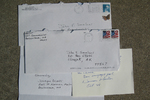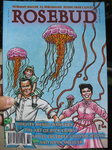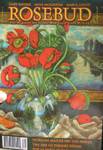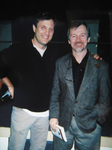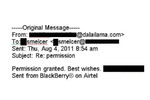John Smelcer’s Ethnicity, the End of a Controversy, and the Willful Ignorance of Bullies Who Attacked Him for Years Regardless of the Truth
"What impresses me most about John Smelcer, aside from his powerful writing, is his indomitable spirit. He has never given up; he has never let others quiet his voice. He continues to write and the world continues to listen to what he has to say, despite his marginalization by the very people who should encourage him most." -James Welch, American Book Award winning author of Fools Crow & The Indian Lawyer
"John Smelcer's poems bring one a strong sense of his Indian ancestry, his constant and haunting awareness of the indigenous life so grievously wounded yet still alive around and in him. As a pioneer in exploring the almost defunct Ahtna Athabaskan language for some of his own work, which he then translates into English, Smelcer is taking an active step towards rescuing it for his contemporaries. When he evokes the Alaskan landscape, its fauna, its myths, one can't help but feel one is hearing the voice of a late twentieth century individual poetic sensibility and the collective voice of the people of that landscape in times past. This gives his work an unusual and valuable resonance." -Denise Levertov, foreword to Songs from an Outcast
"The North, the winter, warmth within cold--this poet speaks from the land, and for the land and the people who belong to it." -Ursula K. LeGuin, backcover, Songs from an Outcast
SETTING THE RECORD STRAIGHT
By all applicable laws of the United States, most importantly by the Alaska Native Claims Settlement Act (ANCSA; 1971, 1987 Amendments), the largest indigenous legislation passed by Congress in American history, I am Alaska Native/Native American. I am the son of a half-blood Alaska Native father (see letter from John Smelcer's mother below). My father's mother, my grandmother, was full-blood Native. I have a Certificate of Degree of Indian Blood (CDIB) from the United States Bureau of Indian Affairs (BIA), part of the U.S. Department of Interior. I am a voting member (called a shareholder) of Ahtna Native Corporation. By tribal law, only Natives are eligible to vote (see my 2025 vote verification from Ahtna below). I have not missed a vote in a third of a century. In the summer of 2025, I officially became a tribal elder (see photo below). Since the early 1980s, I have received numerous scholarships from my tribe to support my higher education, including for my bachelors, masters, doctoral, and post-doctoral studies at Harvard, Cambridge, and Oxford Universities. Under tribal policy, only tribally enrolled members may receive scholarships. Continuing its four-decade's long support, in November of 2022, Ahtna Native Corporation awarded me a scholarship to earn a special certificate in Inclusive Leadership from Harvard University. The scholarship included tuition, airfare, and lodging in Boston. To reiterate, under tribal policy, only enrolled, Native tribal members are eligible to receive such scholarships. (See photos below of Smelcer at Harvard; Smelcer at far left in group photo.)
I was raised Native. I participated in our traditional subsistence customs of hunting and fishing. As a young boy, I spent part of my summers living at Tazlina Village with my Uncle Herb who instructed me in traditional Native Ways of Knowing (see photo below). Even back then, Uncle Herb encouraged local elders to pass on their knowledge to me. I also spent part of my summers at my full-blood Native grandmother's house along Moose Creek in Glennallen, just down the road from our village. I spent most my days in the woods or fishing in the creek. Even as a boy, elders like my grandmother recognized and appreciated my interest in learning our culture and language. Of all her many grandchildren and great grandchildren, my grandmother bequeathed her shares in our Native Corporation only to me.
The State of Alaska issued me a license (based on federal laws) authorizing me to create and sell art as authentic Native handicraft. For much of my career, I have served as an administrator for numerous Native organizations. For years, I was the tribally-appointed executive director of my tribe's Heritage Foundation, whose mission is to preserve our culture, language, and traditional Native Ways of Knowing. In addition, I am one of the last speakers on earth of our severely endangered Native language, having learned it from every elder who spoke Ahtna. In 1998, the Ahtna Heritage Foundation in partnership with Ahtna Native Corporation published my dictionary of our language (click on "dictionaries" on the menu to view or download the dictionary or to watch episodes of me teaching Ahtna 101 on YouTube). My work in the Ahtna language is even cited in a book which was named a Finalist for the Pulitzer Prize. After interviewing every living elder who remembered the old stories, I published two collections of our mythology.
In 1999, when I was in my mid-30s, Ahtna Chief Harry Johns held a special ceremony to designate me a Traditional Ahtna Culture Bearer, a term usually reserved for elders with significant cultural knowledge. In 2012, I delivered the keynote address at the FBI's New York City field office during National Native American Heritage Month (November) as part of President Obama's initiative to increase diversity awareness among government agencies. In the fall of 2024, my tribe sent me an official tribal ID card (see below). These facts should satisfy any curious person about my ethnicity. So what is the controversy?
IF YOU WANT TO LEARN THE WHOLE STORY, INCLUDING HOW THE CONTROVERSY ENDED IN 2018, AND HOW BULLIES MISREPRESENTED THE TRUTH FOR DECADES, READ ON.
This article is comprehensive. I apologize if it seems defensive in tone. It has to be by necessity. I hate that it has to exist at all. It is offered in response to a third of a century of bullying and "fake news" about me. In this Internet Age, anyone with online access can say anything they want, often anonymously. That's the problem with the world today. People with empty minds and empty hearts can post anything about anyone online. Nowadays, haters bully others with impunity. Newspapers are full of stories of suicides by young people because of online bullying. You know this to be true. If you are reading this because you have heard or read negative things about me, I ask that you do as I recommended to Winston Groom (author of Forrest Gump): pour yourself a cup of coffee, tea, or something stiffer, sit back, and read on. You may want to read it in sections--some today, some tomorrow. I humbly ask that you read this entire webpage before making any judgment about me and especially before making any adverse decision about my writing.
I should like to say from the start, that, like every writer, I used to hope and dream that my writing would someday provide a better future for me and my family. I hoped to make a living from my writing. I worked hard, writing every single day for the past 35 years (that's almost 13,000 writing sessions). I believed in myself. But after decades of struggling against attacks and "fake news" about me on social media and the Internet, I have come to realize that I can only write out of my love for the process, for the meaning and purpose it gives my life. I write because I have to write. And I will always do so. No one will ever take that away from me. I will never be silenced.
I'm always amazed at how easily otherwise intelligent and generally thoughtful people are duped by the crap spewed by haters. I remember back around 2008, when Stanley Barkan, a long-time American publisher of multicultural poetry, came to visit the university where I was then a Doctoral Fellow. He had accepted a volume of my poems written in my Native language. As I have said before, the poems I write in Ahtna stand as the only literature published in our language in existence. One of the faculty met with Stanley and convinced him that I didn't look Native and so I couldn't possibly speak or write in my Native language. She convinced him that I was making it all up. Concerned, Stanley called me and asked me to come over to the hotel where he was staying. We sat in the lobby and he asked me to read from the poems in my manuscript. I read them as effortlessly and as fluently as I am writing this paragraph. It was clear to him that I spoke Ahtna. After reading the poems, Stanley patted me on the back and said that the woman faculty was full of crap and that she was simply jealous (as many university professors are of their colleagues). He apologized for questioning my integrity and ethnicity. And although Stanley eventually published my book, The Indian Prophet (NY: Cross-Cultural Communications Press, 2012), I was disheartened by the unmitigated gall of both of those racist individuals--both entitled White people--who had no knowledge whatsoever of my Native language or my Native culture, and yet dared to question my connection to both. They represent the way I have been mistreated for most of my life. For whatever reason, folks like them, who have never set foot in Alaska and who couldn't find Ahtna on a map if their life depended on it, think that it's up to them to decide my heritage.
On the other hand, there have been plenty of good people who encouraged me to keep writing, regardless of the crap spewed on the Internet. One such person was my friend, X. J. Kennedy, the esteemed editor of several literature textbooks read by a generation of college and university students. His An Introduction to Literature, An Introduction to Poetry, et. al. were taught for decades. I used them in my own classes. Joe (X. J.) supported me early on. I sent him the first poem I ever wrote in Ahtna, the only piece of literature ever written in Ahtna. We were pen pals for decades after that. In a letter Joe wrote to Rod Clark, the Editor-in-Chief of Rosebud, he wrote: "It's sad that John feels so pained at the coolness he feels from other Alaskan writers and academics . . . It's a shame that a guy with all that talent should feel inferior to anybody." (Personal Correspondence, April 20, 2008)
To learn How the Controversy Came to an End in 2018, scroll down to the end of the first section. Scroll down further or type in key searchwords to learn the truth about the 2017 PEN Center USA Book Awards, the 2004 James Jones First Novel Fellowship, The Absolutely True Fall of Sherman Alexie, and Identity Politics and Racism in the World of Native American Writers. To learn about the monstrous viciousness of one of my attackers, scroll down about three-forths of the way through this webpage or type in the searchword Roxanne Dunbar-Ortiz. The negative stories about me were widespread--blasted into the Internet--such was their authors' malicious intent. Some made their way into newspapers as "yellow journalism" and opinion pieces. My response has been calm, measured, and methodical. Sometimes the truth comes little more than a whisper amid the darkness and fury.
Anyone with a high public profile will understand the following complaint. We live in a society that includes folks who simply cannot abide the success of those of common background or with whom they have (imagined or not) legitimately contested and lost. In addition, and in this particular case, there are disturbed people whose malevolence goes beyond the normal issues of petty jealousy and competition. It has been suggested that some established Native American writers like Sherman Alexie and others attack me because they want to limit competition from other Native writers vying to get their work published in a commercial industry that publishes so few Native writers. Tellingly, Sherman always referred to himself as America's Indian du jour, reinforcing the notion that only one Native writer can be in the limelight. When their attempts to discredit my Nativeness fails, emboldened by the rampant abuse of "fake news" since the 2016 elections, some of these people publish "alternative facts" about me in the media and online and then peddle their lies as truths. For example, they contacted people who I published (like Stephen King) or who collaborated with me in the past or who wrote blurbs or forewords for my books and lied about me. Then they published stories stating that some of those folks denied that they had collaborated with me in the past or that they had written blurbs for my books. For instance, they stated that Winston Groom (Forrest Gump) said he didn't write a blurb for my novel The Trap and that he had never heard of my novel Stealing Indians, about the Native American Boarding School Experience. In response, I sent Winston our emails from thirteen years earlier. He abruptly admitted he was in error and that he remembered our communications and confirmed that he had indeed written a blurb for my novel and that we had discussed my novel about Indian boarding schools. I think he genuinely felt angry that he had been manipulated by Debbie Reese, the woman who contacted him, and he scolded her not to involve him in her little personal war against me. But you probably never saw the correction to the negative article you read about it. That's they way corrections usually go, buried deep on some unread page.
In the same article, they wrote that Jack Zipes--the world's foremost scholar of the fairy tale (who was personally encouraged to study fairy tales by none other than Albert Einstein)--didn't publish an interview with me. They lied. Jack loved the interview and we continue to communicate even today. In fact, Jack wrote a wonderful blurb for my forthcoming novel, The Beast in the Dark, an Alaskan Native fairy tale, of sorts. They similarly lied about H. H. the Dalai Lama, saying that I did not have his permission to use his words with my writing, including on my novel, The Gospel of Simon. I did. To learn the truth, type in Zipes, Groom, Stephen King, or Dalai Lama in a keyword search of this webpage.
The fact is, even though it's been years since the August 2017 fake news articles about me came out, not a single individual, agent, attorney, or representative of any estate has asked me, my agent, attorney, communications liaison, or any of my publishers to remove a single blurb from a single book I have ever published.
Every so many years, especially when one of my books is up for some prestigious national award, someone digs up the old story of how I resigned from the University of Alaska Anchorage in the summer of 1994 and imagines he or she has discovered something new that must be shared with the world. People I have never met attack me for reasons best known to themselves or to their therapists; they needlessly attack my credentials, my writing, my heritage, and my language. They criticize me for speaking and writing in my Native language and for doing everything I can to help preserve it for the next generation, according to the wishes of every Ahtna elder who served on the board of directors of the Ahtna Heritage Foundation when I was the tribally-appointed executive director. They send me anonymous threatening letters, including death threats. They even attack my children, saying they are not mine.
Behaving as nameless cowards, some individuals send anonymous letters to places where I work and to organizations which I belong or volunteer in an attempt to get me dismissed. Ironically, months after Sherman Alexie attacked my integrity, newspapers across America revealed allegations that he had sexually harassed twenty or more women over decades, many of them Native American. At least one accuser claimed that Sherman promised to give a blurb for her book if she had sex with him, only to retract the promise afterwards. In the face of so many accusers, he eventually admitted to the harrassment. Back in the mid-1990s, Sherman sent me the most racist letter I have ever read. A woman named Debbie Reese who has relentlessly attacked me for over a decade absolutely lied about my father being dead, while another woman posted preposterous lies about me and boasted on Facebook how she and one of her students once mocked me at a public event for reading poems in my severely endangered Native language, of which I am the only tribal member left who can read and write in it. One prominent African American writer (another former student of the woman who mocked me for speaking my Native language and who has no training whatsoever in linguistics) stated publicly that my Native language isn't even a real language, going so far in a racist rant on Facebook as to say it sounds like gibberish to him, similar to the offensive way people called indigenous languages "gobbledygook" in the past.
The same people who attack me criticized a U. S. Presidential candidate for claiming to be part Cherokee, saying that only tribes can determine who is a member. Yet, when my federally recognized tribe declares that I am a member, they say it doesn't prove anything. You can't have it both ways! According to the 2020 U.S. Census, Americans increasingly identify themselves as being of mixed heritage--part this, part that. Most of the established Native writers since the Native American Literary Renaissance of the late 1960s and early 70s are of mixed heritage--part Indian and part European ancestry, generally of immigrants who sailed to America. According to Wikipedia and other sources, the list of such writers is long and includes Louise Erdrich (German), my long-time friend Joseph Brucach (English and Slovak), Linda Hogan (Anglo/English), my late mentor James Welch (Irish), Gerald Vizenor (Swedish), Leslie Marmon Silko (Anglo and Mexican), my old friend Ralph Salisbury (English and Irish), both Paula Gunn Allen and her brother, Lee Francis (Scottish and Lebanese), one of the founders of the Native Writer's Circle of the Americas, and even Joy Harjo (whose mother was French and Irish), the first Native American to serve as Poet Laureate of the United States. As I recall, even Sherman Alexie is of mixed heritage. Yet my detractors say that I alone am not allowed to be of mixed heritage. It is shameful they way these writers and professors owe their careers and literary success to the general publics' appreciation and consumption of diverse voices in America, and yet they reject my diverse voice and experiences.
As I have said, I grew up knowing only the Native side of my family (my mother's letter says as much). Growing up, I never really knew my mother's side of the family living in the Lower-48, what we call the rest of the United States. My mother's family history is Scots-Irish. Her great great grandparents sailed to America during the Great Potato Famine of 1845-1852 and settled in the Appalachians of Tennessee. Her grandfathers and even her father and uncles worked in coal mines and were later sharecroppers. I grew up on the ancestral lands where my Alaska Native ancestors lived for thousands of years. I speak our language and participated in our customs and subsistence practices. I was appointed by my tribe to serve as the Executive Director of our tribe's Heritage Foundation. For my knowledge of our culture and language and for my efforts to preserve it, the late Chief Harry Johns designated me a Traditional Ahtna Culture Bearer at the tender age of 35. And in July of 2025, my tribe designated me as a tribal elder. And yet, despite all this, my writing is marginalized, distorted, and even excluded by other Native writers, many of whom I admire.
The problem is, of course, the story about why I resigned from a job a quarter of a century ago is not new at all, nor is it true. Of course, there’s some truth to the story. Good rumors always have a basis in fact, no matter how perverted. Quite rightly the rumor begins with the fact that in 1993 I was hired as a visiting assistant professor at the University of Alaska Anchorage. I had taught there for years as an adjunct instructor, and in the previous two summers, I was Director of Faculty and Instruction for a unique, federally-funded program for Alaska Native/Native American high school seniors interested in careers in the allied health sciences. The program was housed at UAA in partnership with the hospital across the street where students interned, shadowing professionals and taking anatomy (they even got to dissect a cadaver; I was invited to watch). Halfway though my first year, the provost and dean converted my contract from “visiting” to “tenure track” based on an initiative to increase the number of Alaska Native faculty on campus. There was no application process. I did not apply for this gratefully received promotion. In my case, I was promoted simply because I was an Alaska Native descendant.
For the most part, 1993-1994 was a very good year. I co-chaired the Alaska Native Studies Program. I served on numerous programs and committees to increase student and faculty diversity on campus, served as faculty advisor for the Alaska Native Students Association, and I was on a number of thesis and dissertation committees, including as an outside reader for a doctorate in Education from Harvard’s prestigious American Indian Education Program. I gladly helped the president of the African American Student Association to receive the Chancellor's Men of Excellence Award, which came with a substantial scholarship. (We have remained friends ever since.) I served on the university’s tenure and promotion review committee, and I was hand-picked by the president of the University of Alaska Statewide System to serve on the committee to hire a new chancellor for the university. Although I was a junior faculty member, I was instrumental in working with the university's leadership to establish the time-honored practice of awarding of Professor Emeritus status on retiring faculty who had served the institution with distinction. Before the end of the year, hundreds of students nominated me for the Chancellor’s Award for Excellence for Service to Students. I had a couple books that were published or forthcoming (one in Australia), was co-editor of a forthcoming anthology of contemporary Native American poetry entitled Durable Breath, was poetry editor at a Seattle-based journal of multicultural literature, and I even had a poem accepted in The Atlantic (then called the Atlantic Monthly). At Lee Francis’ (Laguna Pueblo-Anishinaabe) invitation, and at the urging of his sister, Paula Gunn Allen, and James Welch (Blackfeet), I was a founding member of Wordcraft Circle of Native Writers & Storytellers, a national organization. I voted for N. Scott Momaday to receive our first-ever Lifetime Achievement Award. As I said, it was a good year. I looked forward to a long and distinguished career at the university.
But behind the scene, there was a tenured full professor who wanted to get rid of me. (Anybody who has been on a university faculty will understand why that was a problem.) To this day, I believe he was resentful of my success as a junior faculty and saw me as a threat, especially after I was converted to the tenure track (either that or he resented a direct hire in his department.) He did everything to get rid of me. There wasn’t a week that went by that Dean Miller didn’t tell me of the professor’s relentless and fruitless attempts to get me fired. The tenured professor was Machiavellian in his scheming to get rid of me. But finally, he found a way. I never gave a minute’s thought to how one proves his or her ethnic heritage. How does one prove such a thing? Could you prove yours? I grew up being told I was Alaska Native. In fact, I grew up knowing only my Native side of the family. Even in junior high school I was a member of organizations for Alaska Native students. In fact, it was my father who signed me up for them. In 1978, for instance, I participated in a program for Alaska Native students funded by the Johnson O’Malley Program of the Fairbanks Native Association. We spent several days in the Yukon River village of Nulato participating in their annual potlatch ceremony called The Stick Dance. My Native father signed the permission forms and took me to the airport. When we students returned, the Fairbanks Daily News-Miner ran a story about our experience (c. April 4, 1978; note the first sentence):
For much of the 1980s, I was mentored in traditional Native Ways of Knowing and spirituality by Walter Charley (below), a renowned Athabaskan elder and statesman. Walter was one of the earliest members of the Alaska Native Brotherhood in the early 1950s. Walter's Indian name was U'eldahwi'aasen. He was such a respected Native leader, that in 1988 the Alaska Federation of Natives (AFN) named him Citizen of the Year. Walter was related to me through my grandmother. Like me, Walter was also a member of Tsisyu ("Paint") Clan. Throughout that decade and beyond, Ahtna, Inc. supported my college education through its scholarship program, eventually named after Walter Charley after he died in October of 1992. In 2013 and 2014, Ahtna awarded me scholarships to pursue postdoctoral studies in world religions at Harvard University. As I said earlier, I had never given a thought to proving my ethnic self. I was aware that I had no letter from my tribal Native Corporation and no CIB (Certificate of Indian Blood; also called a Certificate of Degree of Indian Blood) from the U.S. Bureau of Indian Affairs. That distressed professor jumped on this and convinced a scurrilous newspaper reporter (who turned out to be one of his former students) that he should run with the story and that the angle should be that I had perpetrated a fraud. It didn’t help that my father, Charles Smelcer—a half-blood Alaska Native—was a willing accomplice. Apparently, my father failed to tell the reporter that in September of 1987 he wrote a letter to the U. S. Army as a retired Lt. Colonel and Vietnam War veteran, in which he praised my integrity and stated unequivocally to the U.S. government that he is my father (see letter below).
No one ever questioned my father’s motives or why he would go out of his way to so publicly destroy his son. No one ever questioned why my younger brother committed suicide only a few years earlier. No one mentioned that a couple years earlier, my father blackmailed me for $5,000 during a child custody battle, threatening to lie to the judge about me to make me lose my daughter—his grandchild—if I didn’t pay him. By happenstance, I saw him having lunch with the opposing party a few days later. I knew then that he would make good on his threat. Fearful of losing my daughter, I paid him, against the vehement protests of my mother and my uncle (my father’s brother). When the newspaper reporter called my father that spring day in 1994 asking if I was his son, my father saw another opportunity to hurt me. And so he did. My father denied I was his son. Armed with my father’s dehumanizing lie, the newspaper ran damming front-page stories for months, regardless of the truth. My father's heartless action was meant to diminish my credibility as an emerging writer with a growing national audience in order to silence me out of fear of what I might disclose publicly in the future. It should be mentioned that my children (one who is now in her mid-thirties and the other thirteen) have never met their grandfather, his only grandchildren who both bare his surname. He has abandoned them the way he abandoned me. What kind of monster does that?
Early in the controversy, after the first newspaper story appeared in late April of 1994, Ahtna elders, as well as several tribally-elected Ahtna, Inc. Board of Directors (my uncle Herbert included) went to the university and to the story-hunting newspaper reporter stating that I was, in fact, accepted as a member of Ahtna. My grandmother, Mary Joe Smelcer (above), my father’s full-blood Indian mother, sent a letter (above) to the university. My uncle Herbert Smelcer (below), Chairman of the Board of Directors of our tribe and past-president and an influential Native leader who co-signed important Native legislation with the president of the United States, even faxed university officials and the newspaper reporter my birth certificate and notarized documentation that Ahtna, Inc. was in the process of making me a shareholder (tribal member) and that the process might take several months (Alaska Natives born before Dec. 18, 1971 are shareholders in one of thirteen regional Native corporations, Ahtna being one of them). The newspaper reporter flatly replied that none of that mattered and that he wasn’t going to publish anything that helped me. He told me the same thing in a telephone conversation. (I learned later that the reporter was friends with the tenured professor who was spearheading the attacks against me.)
Just a week earlier, during the last week of the school year, the Anchorage Daily News ran a story about the only other Alaska Native faculty at UAA (a Haida woman in sociology) hired under the same initiative, who was resigning after mistreatment by her department. In the article (below), she cited part of her decision to resign was based on the way I had been unfairly treated by the university. The article also stated clearly that the only reason there was a controversy was because my department resented a direct hire for a tenure track position instead of the usual process. My “Native-ness” was not the issue (“Teacher quits in protest,” April 24, 1994, B1-B6).
Two days after the newspaper published yet another disingenuous story on May 19, 1994 my uncle Herb (my father’s younger brother) sent a letter to the university and the newspaper stating that “John is native” and repeated that Ahtna, Inc. was in the process of issuing me shares to become a voting Native shareholder. He also re-faxed copies of the executed document to the university and the newspaper. I told the university and the newspaper that with my uncle's help I had sent my birth certificate to the Bureau of Indian Affairs, but was told it could take half a year to process. I asked for time to resolve the issue. But again, the reporter at the Anchorage Daily News refused to make the contents of either documents public or to publish them. Friends also wrote supporting letters, which were never printed or made public (see Prof. Larry Vienneau's letter below). I stood my ground for a while, maintaining that I hadn’t misrepresented myself. But I was thirty years old and this was my first real job. I had no money to speak of, and I had a wife and a six-year-old daughter at home. I paid a lawyer $1,000 to represent me. It was all the money I had. As anyone knows, even counted in 1994, a grand doesn’t go very far with a lawyer. On August 1, 1994, I handed the new chancellor—the one I helped to hire—my letter of resignation, not because I had done anything wrong, but because I had no more resources to continue to fight and because it was clear to me that I was no longer welcome in a department full of colleagues and friends I had worked with part-time for years. Ironically, Ahtna Native Corporation immediately hired me as an archaeologist.
Within four months of leaving UAA, and at my uncle’s and grandmother’s insistence, Ahtna, Inc. Board of Directors voted unanimously to issue me shares, a tribal ID card, and a letter stating that I was Alaska Native of one-quarter blood, and the U. S. Bureau of Indian Affairs issued me a CIB stating that I was Alaska Native of one-quarter blood, the legal definition of Alaska Native under the 1971 Alaska Native Claims Settlement Act, a federal law passed by Congress (amended, 1987; see legal definition below).
The story would have been very different if the university had just given me the time I had requested.
Four months after I resigned, I received a letter in the mail (below) from Associate Dean Arlene Kuhner, who had been Chair of the English Department for many years. Arlene was an honest woman and a dear colleague. She was also my mentor. Arlene was dying of cancer, but before she passed from this world, she wanted to set the record straight. She was appalled by the racist actions of certain members of her department. Dr. Kuhner bravely named the individual responsible for the wrong-doings against me. I guess she wanted a clear conscience. She told me that the professor bragged about how he got rid of me. She told me that she also sent the letter to the reporter at the Anchorage Daily News, who, having no desire to issue a retraction and admit wrong-doing, ignored it. She then sent it to the defunct Anchorage Times, also to no avail. She told me she mailed a copy to the New Yorker to clear my name. I thank her for her courage.
A year later, almost as an affront against the university and the newspaper, Ahtna Native Corporation—the very Native tribe that the Anchorage Daily News so publicly proclaimed I was not a member of—hired me as the executive director of the tribe’s Heritage Foundation, charged with the task of documenting and preserving its culture, language, traditions, and Native Ways of Knowing. Shortly after it was announced in the tribal newsletter that I had been appointed as the new executive director of the Foundation, my father tried to get me fired. Ahtna stood up to him. A few months later, the new chancellor of UAA visited our tribal offices in Glennallen, where he learned firsthand that the tribe had appointed me executive director of the Foundation. I doubt he ever told anyone back at the university what he had learned that day. I suppose no one wants to admit they were wrong. During my years at the Ahtna Heritage Foundation, the Governor of Alaska and his commissioners appointed me to serve on various state commissions for Alaska Native issues.
For three years, I served as Executive Director of the Foundation, driving 180 miles each way to work every week and living in my rustic cabin on my BIA land allotment atop a bluff overlooking the confluence of the Tazlina River and the Copper River, where I could see my uncle’s cabin and our family fishwheel from my window. One of my Ahtna relatives was Katie John from Mentasta Village. Katie became an important voice in Native rights after she challenged the State of Alaska for traditional subsistence rights at Batzulnetas, her familiy's traditional fish camp along the Copper River. The federal government eventually ruled in favor of Native rights in 2001. Katie was one of the many elders who worked with me on the Ahtna dictionary. Over three summers, I planned and facilitated our annual Ahtna Culture Camp along the banks of the Copper River near Gulkana. I loved my job. I resigned only after a new president of Ahtna, Inc. was elected and immediately directed me to change the focus of the foundation, ordering me to manufacture Native trinkets to sell in tourist traps, to design souvenirs for the annual Shareholder's Meeting, and to organize corporate banquets and events, all contrary to the Foundation’s mission statement to preserve and teach our culture and language. During a private lunch in Anchorage, he told me "It was his way or the highway.” I refused to compromise the integrity of the foundation, and so I left in June 1998. In my resignation letter, I described to my board of directors what he planned for the foundation. Not unexpectedly, that new president of Ahtna who ordered the founadtion to sell trinkets to tourists was voted out of office a year or two later for misappropriation of funds. In 1999, Ahtna Chief Harry Johns (below) held a special ceremony in Copper Center designating me a “Traditional Ahtna Culture Bearer,” a term usually reserved for elders with significant cultural knowledge.
As an example of my father's disdain of me and my desire to help preserve Ahtna culture and language, one summer in the early 2000s, members of our Native family traveled to Tazlina to help my uncle Herb build his retirement house. Prof. Larry Vienneau drove down from Fairbanks to help. My father was also there. During a break, I showed my dad the new Ahtna Dictionary that the tribe had just recently published. As I proudly tried to hand the book to him, my father threw up his arms and recoiled from me, literally stepping back from me. He wouldn't even touch the book that I and many elders--including his own mother and aunt and other relatives--had worked on for years. Larry saw the whole thing. Afterwards, while Larry, Herb and I were in the basement installing rigid insulation against the cement foundation (using one of those guns that shoots nails into concrete with a .22 bullet blank), Larry asked Uncle Herb why my father (Herb's older brother) hated me so much. (To learn Herb's response, see Prof. Vienneau's letter above). It was one of the last times I ever saw my father. I saw him at Grandma's and Herb's funeral potlatch not long afterward. Even though it's been decades, I still hurt whenever I think about that moment and about how much my father hates me, his only child.
Five years after I left UAA, individuals statewide nominated me for the Governor’s Award for the Humanities for my work in preserving Alaska Native cultures and languages. Until his death in 2004, my beloved uncle Herbert Smelcer, my father’s own brother and an important leader in Alaska Native politics for decades, supported me as if I were his son. Since 1994, I have never missed a tribal vote (only Alaska Natives as defined by ANCSA can vote. See Ahtna voting policy at top of this webpage.), and I regularly receive my annual tribal dividends (see below), including a special dividend issued in April of 2020 to financially help tribal members during the Coronavirus pandemic. When my beloved grandmother passed away in 2003, of all her many grandchildren and great-grandchildren, she left me her tribal votes.
Over the next decade, I worked for different Alaska Native organizations in various leadership roles, including as a tribal grants administrator at Chugachmiut, as a department head at the Alaska Native Medical Center/South Central Foundation (I earned a certificate of advanced graduate study in Health Care Administration from Texas A&M University), and as director of Chenega Native Corporation’s Culture and Language Project, which I directed for almost five years. My uncle Herb and I briefly operated Copper River Indian Adventures, a Native-owned ecotourism river-rafting company. I served on statewide committees for Native issues, including the Commission for Alaska Native Tourism and the Alaska Council for the Arts committee on Alaska Native Museums after being trained by the Smithsonian’s Museum of the American Indian in 2004. That same year, the State of Alaska issued me my Silver Hand permit, authorizing me by state and federal law to create and sell handcrafted art as authentic Native art. In 2012, I delivered the keynote address to the FBI’s National Native American Heritage Program in New York City, mandated by Presidential Executive Order to increase multicultural awareness in federal agencies.
For decades now, people contact Ahtna or individual members of Ahtna's Board of Directors, all tribally-elected, and ask them if I'm Native. They are told that I am Native and that I am a member of the tribe. But no matter how many times they get the same answer, some people never stop asking. Roy Tansy, Sr., one of our longest-serving Ahtna leaders, told me he was tired of people bothering him about it after so many years. In 2018, he gave me the letter below and told me to share it however I wished. I've known Roy a long time. We hunted caribou together in the Cantwell region. He used to be on the Board of the Ahtna Heritage Foundation, where I had served as Executive Director in the 1990s.
Since the mid-1990s, my writing has appeared in anthologies of Native American literature published in the US and the UK, and I co-edited two highly successful anthologies: Durable Breath: Contemporary Native American Poetry (1995), taught in Native American literature classes at colleges and universities across America, and Native American Classics, named one of the hottest graphic books of 2013, which I co-edited with my longtime friend and Abenaki writer, storyteller, and scholar, Joseph Bruchac, and which was illustrated by Native artists. Important university presses, including UCLA's American Indian Studies Center (which published mine and Sherman Alexie's earliest volumes of poetry), Fairleigh Dickenson University, and Truman State University Press have published my books of poetry related to the Native experience.
I've endured these malicious misrepresentations for far too long. It is now the dawn of a third decade, and yet they persist, perpetuated mostly by a woman named Debbie Reese, who, since 2007, has made it her personal crusade to ensure that no publisher would publish my writing about the Alaska Native/ Native American experience.
It is frustrating and disheartening that so many Native elders (most of whom are gone now) entrusted me--one of the few members of the younger generation interested in learning the old ways--with their cultural and linguistic knowledge so that I could help sustain our traditions in the future, only to have people who have never stepped foot in Alaska work so hard to keep my work from being published. It is a disservice to those elders. More than frustrating and disheartening is the undeniable fact that I am the only member of my tribe who has ever written literature (poetry) in my severely endangered language--and therefore what I write and publish stands as the only literature in our language in existence--and yet so many editors, having read some negative blogs or posts about me, choose not to publish my poetry and so condemn the only existing literature in a language to oblivion. Those same editors chose instead to publish poems in languages with millions of speakers. How will any record of our language and literature survive when the very people who say they value literature in other world languages don't support it, but instead actively marginalize it? But what hurts the most is the way some people with whom I have communicated for years in the old epistolary tradition of exchange of letters (nowadays as emails) and who I consider "friends," sometimes abandon our friendship simply because some callous and unthinking person sent them some of the negative blogs or posts about me. Those same folks would be the first to say that "Fake News" and social media is destroying the fabric of society, and yet they won't even take a little time to read this webpage to learn the truth. I'd be lying if I said it didn't hurt.
Truth languishes in a world where national media lies to the public constantly. It is little wonder that folks on the internet lie unabashadly, without fear of reprisal. Unfortunately, anyone can say anything on the internet.
As an example of the way some publishers and editors have mistreated me, I’d like to relate something that happened to me recently at one particular magazine—one touted as among the oldest journals in America. For many, many years, my poems graced the pages of almost every issue of this quarterly journal alongside poems by Pulitzer Prize winner, Mary Oliver, one of America’s most beloved poets. They never paid me a dime for my work. I was proud of my affiliation with the journal. In 2022, I was working with the journal’s long-time poetry editor on this one poem, which he had happily accepted. We were doing our usual back and forth, editing the poem for publication. I always enjoyed our emails. The poem was about the name of one of the rivers in my tribal lands, the Gulkana River. The poem raised the question, “What does Gulkana mean?” In the poem, I explained the meaning in our language and retold a tragic event I witnessed decades ago. The editors asked me to provide a brief author’s bio to accompany the poem, which was the usual practice. Because the poem answered how I could know what the Indian word meant, I simply mentioned in the bio that I am a member of the Ahtna tribe, from which the Native word “Gulkana” derives.
That’s it. I simply provided enough information so that readers would understand how it is I came to know the meaning of the word. There is no question that I am a member of the tribe and that I edited and published a dictionary of the language, including Place Names like the Gulkana. The poetry editor wanted to delete that simple, yet essential, statement of fact. I replied that if it was ok with him, I would like to keep it. After all, both the editors had reviewed documents from my tribe and from the US Bureau of Indian Affairs (BIA) stating that I am in fact Alaska Native. The cowardly editor-in-chief, Christine Woodside, had a fit that I dared ask such a question and withdrew acceptance of my poem. She said they would never publish me again. That racist editor took it on herself to decide my ethnicity, despite the fact that she knew I was a member of the tribe, and that I had for years been the tribally-appointed executive director of my tribe’s Heritage and Cultural Foundation. She decided it was more important to avoid any possible controversy than to support a writer with whom the journal had enjoyed a decades-long relationship. By trying to be neutral, she instead gave credence to unfounded claims. Her decision hurt me deeply and empowered those who bully me. The irony is it is unlikely that any reader would ever have complained about the poem or its author. It was just a little poem about the name of a river in Alaska that almost no one has ever heard of. And even though the poetry editor and I had agreed to make the suggested changes to the bio, the editor-in-chief simply abandoned me. Click on the pdf below to see the poem and the suggested edits by the poetry editor. I'm happy to say that another, much higher circulated magazine accepted the poem and paid me $200.
I’ve suffered much from the injustice and been excluded from countless opportunities along the way. I’ve been shunned by other Native writers, many I respect and admire. Some of those Native writers have convinced editors to exclude my writing in anthologies. Because of the sheer volume of criticism about me on the Internet, it has been difficult for me to get jobs. As a consequence, my family has suffered. More than a dozen years after I left the university, some heartless professors treated my adult daughter unfairly when she was a student in their classes after learning that she was my daughter (my tribe supported her college education with scholarships). Thankfully and ironically, in a full-page article about my poetry book, Indian Giver, published on Sunday, May 8, 2016, the Anchorage Daily News (now called the Alaska Dispatch News), the very newspaper that published the untrue stories about me more than two decades ago, acknowledged that I am Alaska Native (see below). The same newspaper published a different article about one of my other books on August 20, 2016 again acknowledging that I am Alaska Native (below; see last paragraph).
JOHN SMELCER VINDICATED AFTER DEBBIE REESE KILLED OFF HIS FATHER AND SHERMAN ALEXIE IS DISGRACED AFTER REVELATIONS OF SEXUAL HARASSMENT AND BULLYING
I don’t know why my father hated me so much. I don’t know why he didn’t love me. I have no childhood memories of him hugging me, or holding my hand, or reading to me at night. He never said a kind word to me or about me, no pat on the head for a job well done. In fact, what I most remember is all the times he called me "a dumb, stupid kid." I have no loving memories to cherish. I only remember how cruel, hard, demeaning, and abusive he was to me and my little brother and how we feared him coming home. My father's own siblings frequently apologized to me for the way he treated me. "We don't know why your father is so mean," they'd tell me. Despite his mistreatment, I wanted to be a good son. I wanted to earn his love and respect, the way all sons want their fathers to love them. I did everything I could to earn his love. I tried to be like him. I graduated from the same high school in Fairbanks that he graduated from. At his urging, I spent a year as a foreign exchange student in Sweden. I graduated with a 4.0 g.p.a. in my senior year (see photo below). I went to the same university he attended (UAF), where I was an ROTC cadet studying to become an Army officer just like him. I excelled, earning numerous medals (see photo below). At sixteen, I joined the Civil Air Patrol (CAP) in Fairbanks so that I could earn my pilot's license, just like my dad.
Wanting to be a leader like my father, I even ran for president of the student government in high school and at university. When I was 15 or 16, my dad came to me for a loan. I had been saving money for years from bagging groceries and mowing lawns. He needed several thousand dollars to put down on a parcel of land with a cabin on the Goodpaster River or maybe it was to buy a brand new boat so he could go to the cabin. I don't remember for sure. I loaned him the cash without hesitation and he paid me back quickly as promised. I always felt a little proud that I was able to help my dad. Years later, I built my own cabin on five acres downriver from his property. I bought my own boat. I wanted to be strong and tough like he was, so I became a world class weightlifter, setting countless records in the sport. I even went to graduate school to earn graduate degrees, just like my father who has a MBA. But no matter how hard I tried to earn and deserve his love, it was never given to me. Instead, time and again, he tried to destroy me. When I graduated from high school, my dad gave me a suitcase and told me to get out and never come back. We haven't spoken in decades. My two daughters have never met their grandfather, and my brother committed suicide to escape our father's hatred. I was by no means a perfect son, but I strived to be a good son, a decent son, worthy of my father's love. I've often compared my relationship with my father to the Greek myth of Chronos, the father of Zeus and the other gods of Olympus, who killed and devoured his offspring, lest they rose up against him one day. I've often thought that if I wrote an autobiography of my childhood, it would be called Chronos.
For nearly a quarter century, every negative article and social media attack against me and my writing has been based solely on a single sentence uttered by my abusive father to a newspaper reporter in 1994 and repeated to a woman named Debbie Reese more than a dozen years later: That he is not my father (and therefore I must not be Native). Everything else stems from it. For over a decade, Debbie Reese has reported the statement as if it was an indisputable fact and has relentlessly tried to destroy me based on it. After more than two decades of scurrilous attacks, I finally posted a letter my father wrote in 1987 to the U.S. Army in which he stated unequivocally that he is my father. I also posted my official birth certificate (see below) that proves my father is my father. Both documents threatened to undo everything Debbie Reese had ever said or written about me. I imagine that in a panic, Debbie Reese tried to contact my father, leaving a series of desperate phone messages telling him about the documents and demanding an explanation and that he help her refute them. Sick and tired of Reese harassing him, unable and unwilling to refute the documents, and no longer wishing to perpetuate the tired controversy, my father asked his wife to tell Debbie that he had died so that he’d never again be bothered by her or anyone else. And so, shortly thereafter, on June 9, 2016, Debbie Reese published an article on her blog in which she pronounced that my father was dead (see below screenshot taken on January 2, 2018; highlight added).
Debbie Reese and her thugs act the way racist people declared that Obama wasn't born in America, even after he presented his official Hawaii birth certificate. Too stupid and too stubborn to accept what they witness with their own eyes, those same ignorant folks said Obama's birth certificate must be fake. I hear folks say the same thing about my birth certificate. There's no pleasing some people. Their stupidity and bigotry is rooted too deeply in their callous, hate-filled soul.
For eighteen months after Reese published her deceitful article, friends contacted me to ask if I had heard that my father had died. Some even offered their condolences. It surprised me that no one ever searched for an obituary for my father, for there is none. My father is alive and well. In fact, he was seen at a salmon fishing charter on June 8, 2017, a year after Reese said he was dead, and he was a door prize winner at our Native corporation’s annual meeting on July 8, 2017, thirteen months after Reese said he was dead. He was featured in our tribal magazine in October 2019, a full three years after Reese proclaimed him deceased (see photos below). My father was featured in our Summer 2022 tribal magazine attending the June 2022 Ahtna Annual Meeting (see photo below) and, as a veteran of the Vietnam War, he marched in the Color Guard at the opening of our annual tribal meeting in the summer of 2024 (see photo below). It astonishes me that Reese did not verify my father’s death before publishing it as fact, but then she has always been loose with facts when it comes to anything related to me.
In response to me posting my father’s letter and my birth certificate, Debbie Reese complained in her dishonest article (see above) that she is “frustrated” and that I “cloud the issue by posting such documents”—documents that prove the truth that she has been wrong about me for over a decade (most people would say evidence clarifies an issue). Because of the untrue things Reese has said about me, I have been unjustly abused by people who have tried to censor my writing, denied me opportunities, shunned and excluded me, sent me hate mail and death threats, questioned my integrity, and mistreated my children, while some organizations have surreptitiously blacklisted my books from even being considered for awards, while others unilaterally rescinded my awards—all because they believed what my father and Debbie Reese said about me. Some misguided individuals who aren’t even Native felt compelled to attack me out of a false belief that I had “appropriated” my Native identity. The basis of the controversy has always hinged on the credibility of what my father said about me in 1994 and repeated to Debbie Reese a dozen years later. No one ever questioned his credibility. But when my father feigned his own death in order to avoid talking to Debbie Reese and to distance himself from the controversy—the controversy he created—his veracity must come into doubt, and therefore the veracity of anything he ever said about me is in doubt.
In the following paragraph of Reese's June 2016 deceptive article (see above), Debbie Reese outright lies that my character Lucy in my novel Stealing Indians is based on my grandmother. In fact, Lucy is based on Lucille B., a full-blood Native woman born in 1911 who was sent to Chemawa Indian School in Salem, Oregon. I intervewed her in her home in 1996. We had to stop the interview several times as she started crying from the recollection. She askedme to tell her story, which I retold faithfully in the novel. The real Lucy died in 2002 at the age of 91. I attended her funeral. (See photo above of Lucille taken by the author.) As always, Debbie Reese misrepresents the truth about me and my writing.
One of the most prominent Native writers who perpetuated the injurious stories about me is Sherman Alexie. In a Seattle Times article published on February 28, 2018 detailing allegations of years of extramarital affairs and sexual harassment/misconduct by more than twenty women (including Natives) who complained that Sherman abused his power of celebrity to manipulate and lure them into uncomfortable sexual situations, Sherman admitted that "over the years, he has done things to harm other people." It wasn't only women he had been injuring with his fame over the years. Sherman had the audacity to attack my integrity in a small Seattle newspaper only seven months before the revelations of sexual harassment. A week after the Seattle Times story, NPR published a story about Sherman after interviewing many of the accusers (see "The Absolutely True Fall of Sherman Alexie" about two-thirds of the way down this webpage).
After a quarter of a century, the controversy is finally over as it has been proven conclusively that my father deceived Debbie Reese, just as he deceived the newspaper reporter in 1994. Reese constantly misrepresents the truth about me and my writing. Nothing Reese says about me or my father can be considered credible. My longtime attacker Sherman Alexie has also lost all credibility. Certainly, Reese’s most fanatical followers will not change their opinions of me. I doubt a single individual will apologize for their unkindness, for like “Birthers,” some folks are too stubborn to admit they were wrong even in the face of the overwhelming evidence that’s been public for years that proved I am Native. I’m counting on the rest of you to see this for what it is—the end of the controversy. (To share this story with others, download the pdf below.)
THE MALICIOUS & WILLFUL IGNORANCE OF BULLIES WHO ATTACKED JOHN SMELCER FOR DECADES DESPITE THE TRUTH
Since 2007, Debbie Reese (Pueblo) led the criticism of me on the Internet and orchestrated social media attacks against me saying that I had no business writing about Alaska Natives or about Native Americans, not even about my own grandmother and her sister who implored me for years to write my novel, The Great Death, about a pandemic that devastated Native communities all across Alaska nearly a century ago, including my own tribe. My mentor, Walter Charley, told me how he lost his entire family to the plague when he was a boy. Over many years, I interviewed elders from my own tribe and others to learn more about the plague, which Natives referred to as "The Great Death." I have visited old village sites that were abandoned because of the plague. In her blog, Debbie Reese accused me of “culturally appropriating” my Native identity and the historicity of the novel, as well as the Native words and phrases I used in the book, purposefully concealing from readers the fact that I speak Ahtna fluently, am the only tribal member who can read and write in it fluently, and that I published a dictionary of the language in 1998—a fact easily checked on my website, which was listed on the book cover as well as on the audiobook. An epidemiologist from Anchorage even talked about the devastating effects of the plague on Native communities on NPR. And yet, more than one Alaskan librarian has informed me that, in her desperate effort to discredit the book, Debbie Reese contacted them and asked if the plague really happened. Not only did they tell her it did, at least one librarian sent her newspaper clippings from the period to prove it really happened. None of that mattered to Debbie Reese. She slammed the book nonetheless on her blog, withholding the truth from her readers just as she lied to readers saying my father was dead.
This is what Debbie Reese has done to me for more than a decade: she deliberately misrepresented the truth about me and my writing so that no one would read these amazing stories as related to me by the people who witnessed and survived them (most of whom are gone now). She demeaned those elders who told me their stories about what happened to them and their families and their villages. She relentlessly emailed the disingenuous 1994 newspaper story and her own deceitful articles about me to people in an attempt to alienate and to injure me.
On April 8, 2016, Debbie Reese posted a review of my poetry book Indian Giver on amazon admitting that she hadn’t read the book yet, but she gave it a one-star rating nonetheless. She included in her byline that she’s a member of the American Library Association. I’m certain the ALA doesn’t condone members censuring books before they’ve been read. In fact, I know they don’t. The ALA is very much aware of her abuses. Following suit, some of Reese's supporters go on amazon and give my books one-star ratings without ever having read them. Because of her failure to be impartial, Kirkus, a book review industry leader, stated in June 2016 that they would never assign or publish a review of my work by Debbie Reese or knowingly by any of her friends. Other journals have told me the same thing. I have been told that Reese has been kicked off of public discussion panels because of her ascerbic comments.
If you are a school or public librarian, stop listening to anything Debbie Reese says about American Indian literature for young readers. She is not impartial or fair. She is not a spokesperson for Native Americans in any way, not even for her own tribe. She should not be a gatekeeper for Native writing. Indeed, it is dangerous to allow a few individuals to be the arbiters of an entire ethnicity. Read the books for yourself and make your own decisions based on merit. To learn what other Native American writers and scholars think of people like Debbie Reese, read Lee Francis' powerful article (pdf) at the end of this webpage.
In May 2016, Reese emailed the 22-year-old disingenuous newspaper story to people who wrote blurbs for my recent books pressuring them to retract their praise (she didn’t tell them about the new story by the same newspaper, the one that says I am Native). A woman named Roxanne Dunbar-Ortiz, who had previously been kind to me and praised my books for almost a year after she first provided blurbs for them, suddenly became cruel and vicious. To placate Debbie Reese, she claimed that I "conned" her somehow, which is untrue. When I implored the woman to read this webpage to see documentation that I am Alaska Native, she replied that she wouldn't look at anything, stating that her friend had "told her I wasn't Native and that was good enough for her." I'm constantly amazed at how quickly a person will try to destroy another person all because someone else told them they shouldn't like him. My heart is a cemetery full of the holes left by such people.
Over three decades, I cultivated a network with other writers in the literary world. As the poetry editor of a national literary magazine (Rosebud), I communicated with tens of thousands of writers--some famous, even iconic; others just beginning--and received an estimated 250,000 poems! The Boston Globe once called Rosebud "the best literary journal in America." For most of that time, I gave personal, handwritten comments on every submission (no form letter). Some of those fine authors offered a few kind words of praise for my writing, sometimes, I think, because I was writing from the allure of Alaska, but also because they aware of the efforts to marginalize me and they wanted to help me. But mostly they gave blurbs because they recognized that my books had some value to the world. Over three decades, I have submitted my own writing to hundreds of editors around the world, establishing an even broader network in the literary world. I have given blurbs for dozens of books by other writers. I'd like to point out that Rosebud is a 501 C3 nonprofit. It has never profited from a single issue, and in all those years, I was never paid a single dime. It was a labor of love. Over those many years, I have paid thousands of dollars in honoraria to writers out of my own pocket. Over the decades, I have judged numerous national and international literary prizes, for which I have never received payment. I have spent my life volunteering in the service of promoting contemporary literature in the world. The same can be said of my two dictionaries of endangered Alaska Native languages, both of which have always been available for free, and of my collection of myths from my tribe, Trickster, for which I donate all royalties to my tribe's scholarship fund (the same scholarship that supported my college education as well as my oldest daughter's).
Debbie Reese and/or her surrogates have contacted publishers, journal editors, and literary award committees and tried to coerce them to withdraw my writing from publication or awards consideration. Unfortunately, some cowardly editors have caved to the organized social media pressure, afraid of negative publicity. An outright lie she and her surrogates propagate is to say that my writing perpetuates negative stereotypes of American Indians to discourage librarians and other folks from ordering my books and to convince editors to censor my writing, again failing to disclose that my books include blurbs by major Native writers, historians, and scholars who praise the contents. I'm an Insider--a tribal member and culture bearer who is also a cultural anthropologist; I've been a university professor of Native American literature and co-chair of Native Studies, I speak my Native language. My books don't stereotype. They don't "appropriate" Native culture. They celebrate it. Many of them tell histories that have been forgotten or marginalized. It's part of their m.o. They criticize my occasional use of the word "Indian" in my writing, even though Sherman Alexie, one of the most successul Native writers, once wrote, "Indian is not a derogatory word. It's what we call ourselves." In fact, two of his books include the word "Indian" in the title: The Toughest Indian in the World and The Absolutely True Diary of a Part-Time Indian. In his autobiographical essay "The Unauthorized Autobiography of Me" (Here First, Random House/Modern Library, 2000), Sherman writes, "I have never met a Native American. I have met thousands of Indians" (4). Alexie next describes a panel discussion where a white woman in the audience asks, "Why do you insist on calling yourselves Indian? It's so demeaning." To which Sherman replies, "The word belongs to us now. We are Indians, pronounced In-din.We own it, and we're not going to give it back" (4). From my own experience, my fellow tribal members proudly refer to themselves as Indian and wear tee-shirts that proudly declare "Indian Pride." Debbie Reese and her mob criticize me for using the word "Indian," saying it stereotypes, but they use the word every time they refer to the lands in the United States that are occupied by or sovereign to Native Peoples, which they proudly call "Indian Country." Even Native America's most widely circulated newspaper is named News from Indian Country.
To illustrate this double standard, in the spring of 2016, Kenyon Review's long-time poetry editor, David H. Lynn, who has published my poems in KR since his first days as poetry editor in 1994, retracted two of my poems after a few folks like the white lady in the audience in Sherman's vignette, claimed they negatively stereotyped Native Americans. At first Lynn retracted them stating that I had previously published the poems embedded in an essay about Native literature and that it was against KR policy. I told David the mistake was inadvertant and apologized. But shortly thereafter, he removed that statement and posted the following: "In the Spring issue of KROnline, we published two poems by John Smelcer, 'Smoke Signal' and 'Indian Blues.' I appreciate the many readers who have contacted us to point out that these poems contained damaging stereotypes of Native people. I deeply regret the manifest distress this has caused and take full responsibility."
While I respect David (we have both been poetry editors for about the same number of years), his statement is a perfect example of the double standard applied only to me. One of the two poems, "Smoke Signal" is based on a true event that happened to me while riding my motorcycle in upstate NY in the fall of 2010. Up around Syracuse, I met a full-blood Native biker from an upstate tribe at a diner and we cruised together for a while (see photo below of John Smelcer on his motorcycle with his youngest daughter in Binghamton, NY, May 2011). The poem is about two Rednecks in a pick-up truck who shout racist taunts at a Native biker on a red Indian brand motorcycle at a red light. When the light turns green, the motorcycle peels away in a fury, the smoke rising from the tailpipe taking the shape of a middle finger. It's an unflinching poem about pride and resistance in the face of racism. Compare my poem to the following from Sherman's "The Unauthorized Autobiography of Me":
"Summer 1995. Seattle, Washington. I am idling at a red light when a car filled with white boys pulls up beside me. The white boy in the front seat leans out his window. 'I hate you Indian motherfuckers,' he screams. I quietly wait for the green light" (9).
Both are examples of poetry as literature of witness (I have no reason to doubt that an event such as Sherman described actually happened to him). Both were written in response to racism against Native Americans. Did readers object to the fact that my character shows his justifiable anger and resentment while Sherman's character was passive? Did readers object to the name of my character in the poem: Duke Sky Thunder? One of Sherman's most famous literary characters is Lester FallsApart, a character whose very name evokes the trope of the drunken Indian. Similarly, Kewa Pueblo cartoonist Ricardo Cate' has a recurring character named Dumb Eagle in his brilliant and satirical comics. Would Mr. Lynn have retracted Sherman's or Ricardo's work as well? Would he have issued the same apology saying they "contained damaging stereotypes of Native people"? Why is it okay for Sherman but not for me? Sherman and I are both members of federally recognized tribes in the Pacific Northwest. His tribe is no more important than my tribe, or any other tribe for that matter. We both have CIBs from the BIA saying we are Indian. We are the same age. My work also appeared in Here First. Is it because Sherman "looks more Native" than I do as some folks have suggested on Facebook? None of this is meant as a criticism of Sherman's writing in in any way. His essay in Here First is brilliant and innovative. I am simply illustrating the double standard that exists. It is worth noting that both poems appeared in my poetry book Indian Giver (2016), of which the author of An Indigenous Peoples' History of the United States had no objection to a single poem and wrote that the book "tells the harsh truth about the continued genocidal colonialist noose around the neck of every Native American. This is not just history, and perhaps the reality can be captured only through poetry wrought by the hand of one of our most brilliant poets."
My other poem, "Indian Blues," is about the suffering and devastation caused by alcoholism in many Native communities, mine included. Two out of three of Sherman's poems in one anthology of contemporary Native American literature (in which several of my poems also appears) are about alcoholism. In fact, Sherman once wrote, "Native America is drowning in alcohol." Unfortunately, for many Natives, we are surrounded by its effects. James Welch (Blackfeet) was my and Sherman's writing mentor. He was one of the most influential figures of the Native American Renaissance. In Welch's novel The Death of Jim Loney, set on the Fort Belknap Reservation in Montana, alcoholism figures in the slow destruction of the main character. In N. Scott Momaday's Pulitzer Prize-winning novel, House Made of Dawn, Abel, the protagonist, who has returned to the reservation after WWII, is disillusioned and unable to fit into society any longer and turns to the bottle. One night he kills a man outside a local bar. Like Sherman and Momaday, I have witnessed firsthand the destruction caused by alcohol abuse in my Native community. I have lost Indian cousins to alcohol, disillusion, and suicide. My poem is an elegy for the loved ones we have lost. It is not stereotyping for a member of a Native community to write about the tragedy of alcoholism. Healing can only begin by first acknowledging a problem exists. Let me say this clearly: Insiders do not stereotype about their group. They write what they see, experience, and know. They write the truth as they see it. If it makes you uncomfortable, that's on you.
I don't wish to make an enemy of David Lynn. For a quarter of a century, he supported my poetry. But his statement illustrates the world I have inherited because of folks like Debbie Reese and her mob who perpetuate lies about me and organizes social media pressure on editors to censor my writing in an effort to silence my voice. It needs to be stated that after reading this webpage at my request, Mr. Lynn sent me a sympathetic email in which he remarked that all these orchestrated attacks against my heritage was "sad." I thank him for his understanding.
In that deceitful June 9, 2016 article where Reese declared that my father was dead (see above), she "concluded" that I somehow parlayed my Grandmother's Gift of Transfer of Stock into getting a CIB (Certificate of Indian Blood). She's absolutely incorrect and ignorant of the laws. A Transfer of Stock simply transfers shares of our Native corporation stock from one family member to another, which determines how many votes you can cast in elections and how much you receive in annual dividends. Under law, stocks may only be gifted (or willed) to a direct family member who is Native, and only Natives are eligible to vote in tribal matters. In the fall of 1994, months after I left the University of Alaska Anchorage, my Uncle Herbert, Chairman of the Board of Ahtna Native Corporation and my father's brother, worked directly with my grandmother to submit the required paperwork for the Transfer of Stock with the tribe. I had nothing to do with it (see the letter below from Ahtna, Inc. to my uncle). I received my CIB from the BIA (Bureau of Indian Affairs) simply because my father is half-blood Alaska Native. Uncle Herb, helped me to send my birth certificate to the BIA, which checked to find my father's name on a list of registered Native enrollees. I suspect Debbie's parents did the same for her when she was young. Even when Reese or other individuals (including so called "reporters") call my Native Corporation and my village association, recognized as a tribe by the U. S. Bureau of Indian Affairs, which both informed them I am indeed a member, they causally dismiss the fact and take it upon themselves to proclaim publicly that they don't think that means I'm Native or that I have any right to say I come from a Native heritage or that can write about Native issues. What makes them think they have the right to make that judgment? Who do they think they are?
What woud you do if someone kept posting on the Internet that you are not African American, Irish or Scotch-Irish, Hispanic, Asian American, German American, Italian American, Polish American, or Jewish?
The 2017 PEN Center USA Book Awards
Stealing Indians, my novel about the American Indian boarding school experience, went through more drafts than any other book I have ever written. I re-wrote the ending half a dozen times. I knew it was an important story. I interviewed dozens of Native elders from across America who had attended such schools. While writing the novel, I was helped along the way by many other wonderful writers. More than anyone else, my longtime friend, Ursula K. Le Guin, sent me "back to the drawing board" to create more sympathetic characters and to give the novel more balance. I will always be grateful for her help. Over twenty years or longer, I published Ursula's poems in Rosebud, and she graciously allowed us to establish a fiction award in her name. I published three of Ursula's poems in issue 63 of Rosebud just weeks before she passed away in late January, 2018. Days before she died, she wrote a kind letter expressing her enduring gratitude to Rosebud (see below).
I was honored when I learned that Stealing Indians was a finalist for the 2017 Pen Center USA book awards. But within two hours after receiving a congratulatory email from PEN Center USA in mid-August 2017, Debbie Reese sent out a barage of emails to her followers across the nation urging them to attack me en masse with the purpose of getting my book withdrawn. (I know this to be true because one of the emails was accidentally forwarded to me with the rallying call to attack me in the Subject Line.) Within hours, her surrogates began an orchestrated effort to derail my book, posting and publishing negative articles about me on social media and even on PEN Center USA's website. The posts were hateful to say the least. One cruel individual posted that my youngest daughter is not really my daughter, because they once saw me pushing her around campus in a baby stroller and they thought she "looked Asian" (see the photo above of me and my daughter on my motorcycle around that time). The individual claimed that I must have adopted her to make people think she's Native and therefore think that I'm Native.What kind of sick person says such a thing? The truth is she is my biological daughter (both my daughters are. In fact, in the fall of 2021, my youngest daughter, now 11 years old, won an art contest sponsored by my tribe and will be featured in our tribal magazine). How will she feel if she reads that online someday? These are the kind of people who attack me--callous cowards who say whatever they want online, regardless of the truth. The truth is my youngest daughter's mother is a descendant of Myles Standish and Stephen Hopkins, both of whom were aboard the Mayflower. Before his Mayflower voyage, Hopkins was aboard the ill-fated Sea Venture, which sunk off the coast of Bermuda, shipwrecking the crew for almost a year, during which time Hopkins was convicted of mutiny for trying to persuade his marooned companions that British authorities had no legal power over them. He was later pardoned and eventually joined the pilgrims on the Mayflower. Both Standish and Hopkins helped found the Plymouth Colony, both signed the Mayflower Compact, and both participated in the legendary first Thanksgiving supper. Scholars believe that the Sea Venture’s shipwreck was the basis for The Tempest and that Shakespeare named the mutinous character Stephano after my wife’s and daughter’s great-great-great grandfather.
Kaylie Jones, a former colleague in a graduate creative writing program where I was once faculty, and Marlon James, a former graduate student in the program, both demeaned my Native language on Facebook. Both had heard me reading my poems in Ahtna at a public event more than a dozen years ago at which I had been introduced to the audience as a member of the tribe, as the former director of my tribe's heritage foundation, as one of the last Native speakers of the language and the editor of a dictionary of the language, and that I had published many of my Ahtna poems in journals worldwide (click on "poems & stories" to read two of the many poems I have published in Ahtna). Kaylie posted how at one point during the reading, a student sitting beside her leaned over and told her, "He speaks good Klingon." Kaylie posted how "she almost fell out of her chair laughing at the joke." Although it's been many years, I remember them sitting in the audience and laughing at me. I also remember how much it hurt me at the time. Kaylie especially should have known better. She knew previously that I was a member of a tribe in Alaska and that I spoke the language (see her facebook post below). In fact, that very summer the James Jones Literary Society's (of which Kaylie is a founding member and the longest-serving board member) newsletter published a story about me that stated that I'm Ahtna Athabaskan Indian and that I speak Ahtna and wrote a dictionary of the language (vol. no 2, p. 8).
Marlon James, whose success I have followed with admiration and unmerited pride because he was a student in the graduate creative writing program where I was faculty, posted that my Native language doesn't exist, calling it nonsensical "gibberish" the way racist people have called Native languages "gobbledygook" in the past. With no degree in linguistics or Native American Studies, on what expertise did Marlon James base his absurb and racist claims? Simply because he didn't speak it or never heard of it? He even allowed his comments to be published in a Minneapolis newspaper despite the fact that he was made aware by other Facebook users that the language was real. In fact, he was sent links to the University of Alaska Fairbanks' Alaska Native Language Center to prove it was real, yet he did not retract his statement nor apologize for it. Before posting such a racist statement, Marlon could have spent a few minutes on the Internet and learned that Ahtna is a real language (see map below of Alaska Native Languages, University of Alaska Fairbanks, Alaska Native Language Center; note Ahtna in red). Within seconds on YouTube, he would have found my Ahtna language teaching project: Ahtna 101. Ironically, more than a year after his attacks against me, Marlon James admitted in an interview in Poets & Writers (March/April 2019, p. 34) and on NPR that he simply reads library books to learn most of the African myths he incorporates into his writings, while I learned the myths of my culture the traditional way--from a lifetime of sitting around campfires listening to elders reciting our myths. I learned my Native language the same way: as an Insider, a member of the culture and community.
(Map of Alaska Native Languages, Alaska Native Language Center, University of Alaska Fairbanks. Note Ahtna in red.)
Kaylie Jones and Marlon James shamelessly ridiculed a severely endangered Native American language with only a dozen or so speakers left, myself included, and then they proudly posted it on Facebook (I have saved screenshots of their Facebook posts). In their offensive and racist remarks, they disrespected an entire culture. I have spent my adult life working to preserve and teach my Native language (and even another endangered Alaska Native language), but instead of being respected for it, people like Kaylie and Marlon mock me. Would they have made fun of someone speaking Chinese, Russian, Hebrew, Maori, !Kung, or Swahili? I know that Joy Harjo (Creek) sometimes publishes poems in her Native language, Mvskoke. I know because our bilingual poems both appeared in Poems From the Edge of Extinction (2019). Would Kaylie and Marlon ridicule Joy for reading her poems aloud? Would they laugh and say it sounds like Klingon? Would they call it gobbledygook? Kaylie and Marlon attack my integrity, but where is their integrity? Where is their decency? Where is their shame? Marlon James would sabbotage another ethnic American writer's chance to win a book award all because he didn't recognize a language the author spoke? (According to Nat. Geo. there are over 7,500 languages in the world.) There is nothing noble about Kaylie Jones' or Marlon James' attacks against me. They are bullies bent on injuring another human being who has never done any wrong to them. I have never said a negative word about either. Marlon and I used to socialize together in the evenings during the residency period (see photo below).
(Marlon James, left, and John Smelcer, right, 2006)
Yet they viciously attack me, their memories clouded by an anger they didn't have until they read one of Debbie Reese's fallacious articles about me. Debbie Reese "recruited" Kaylie and Marlon to attack me, convincing them that I appropriated my Native heritage, yet she never corrected them for ridiculing a Native American language by referring to it as gibberish. How is Reese a defender of Native authenticity if she did not correct these two non-Native individuals for publicly ridiculing a severely endangered Native language as spoken by one of its very last speakers, despite the urgings by other Facebook followers to do so? Reese knew better. She knows for a fact that Ahtna and Pueblo-neighboring Navajo are related members of the Dine' language family (see map above, inset in red).
Marlon James's racist comments in August 2017 did not escape the attention of PEN Center USA. Their lawyer stated that "he found Marlon James's comments to be disgusting."
On his Facebook page, Marlon James also implied that my surname, Smelcer, being of German origin, proved I wasn't Native. (My full-blood Indian grandmother married a man named Smelcer. Does that mean she was no longer Native? What about her children? See the photo below of me and my grandmother and her sister.) The fact is Native Americans don't have names like "Dances With Wolves." It's stereotyping to think so. Again, Facebook followers demanded that Debbie Reese denounce Marlon James's racist comment. She did not. You see, Debbie's own surname, Reese, comes from Old Welsh "Ris" to Welsh "Rhys" and then into German as "Reese." Just like me, Debbie Reese's surname is German, but she didn't want to point that out to Marlon James and take the steam out of his attacks against me. As far as I know, no one was attacking Louise Erdrich for her German-derived surname. It should be pointed out that Theresa Mailhot's surname is French (Normandy) in origin, from Mailot, Mailott, and Mailett ("mallet"). Debbie's first name (all variations) comes from the Hebrew for "bee," Theresa's (all variations) from the Spanish and Greek for "harvester/reaper," and Sherman Alexie's first name comes from the Anglo-Saxon (Old English) for a "shearer of woolen garments." According to Marlon James's racist stereotyping, neither Debbie Reese, Theresa Mailhot, or Sherman Alexie are Native. (I have saved screenshots of these Facebook posts.) It was also posted in a thread on Marlon's Facebook page that I can't be Native because I don't "look Native." I've even heard that someone posted that I can't be Native because my hair is gray and all Natives have black hair. Every full-blood Native elder I have ever known eventually gets gray hair (see photo below of Chief Harry Johns, Ruth Johns, and my great aunt, Morrie Secondchief. See photo of my father near the beginning of this web page). Influenced by Western culture, my grandmother and Uncle Herb dyed their hair. It is human nature for hair to lose pigmentation as we age. Native Americans, like African Americans, are no exception.
These shameful episodes prove that Debbie Reese is no defender of Native identity or authenticity. She will use anyone who is willing to blindly attack me, even when their public comments are racist, stereotyping, and demeaning to Native Americans.
Despite Debbie Reese's efforts to suppress Stealing Indians, the book was taught in schools on the Navajo Nation. In a Skype session, Navajo students told me they loved the novel and that their parents and grandparents who read it also loved it.
There is an underlying assumption that the people who attack me have integrity. They do not. They will misrepresent the truth or withhold the truth, misquote people out of context, or outright lie to fit their agenda. From their blatant racism, they will demean and stereotype Native Americans. Months after Sherman Alexie publicly attacked my integrity in August 2017, more than twenty women brought sexual harrassment/misconduct allegations against him (see Seattle Times story below).
Kaylie Jones also alleged on a Facebook post on August 16, 2017 (see below) that I told her I had a PhD from Oxford. The last time I ever spoke to her was at a coctail party for faculty in mid August 2006. As you can imagine, the reception was noisy, with loud music in the background and everyone talking (and drinking). I hadn't seen her in half a year, such was the nature of the low-residency program. I remember I was wearing a navy blue Oxford University sweatshirt. When Kaylie asked me about it, I told her that I had just returned from a summer semester at Oxford and that I was just about to begin my first semester in a PhD program in creative writing and literature in New York (see letters below) and that the courses I completed at Oxford would be applied as transfer credit toward my PhD. In her memory, Kaylie must have "married" the two pieces of information. Perhaps Kaylie didn't hear me clearly above the din of the loud party. Kaylie Jones posted on her Facebook page that in January 2005, she and another faculty member discovered that I did not have a PhD from Oxford and that I was "immediately dismissed from the faculty." The fact is I didn't even apply to Oxford until January 2006 and wasn't accepted until mid-March and didn't attend until July, a month or so before that fall residency (see letters below). I was proud to learn that I was the first Alaska Native ever accepted into the program. Oxford University wasn't mentioned in any way on the c.v./resume I sent the university in 2004 (although Cambridge University was listed as I had studied Shakespeare there in 2004). Neither was Harvard mentioned as I had not yet undertaken graduate studies there. The fact is I taught in the creative writing program for two years, until the end of the fall semester of 2006. I was not "dismissed immediately" as Kaylie stated. During that mid-August 2006 residency, I received an award in recognition for co-founding the John Gardner Playwriting Award with another faculty member in affiliation with Gardner's estate, the university, and Rosebud magazine.
I was keenly aware during the August residency in 2006 that Kaylie Jones was coniving to get me dismissed from the faculty. I just didn't know why. Some faculty told me it was out of envy. But I suspect the reason is related to a personal matter that transpired between us an hour or two after our conversation at the coctail party that first night when her ego may have been bruised during an innocent yet compromising encounter outside her dorm room, which was more a comedy of errors than intentional. The party ran till past midnight. The party was in a common area between north and south dorms. Unknown to me at the time, one side of the sides housed men faculty; the other side housed women faculty. As a joke, when I asked where my room was, one of my drunken colleagues said it was on the women's side. (I still remember his name.) It was my bad luck that Kaylie's room was the same number as mine, only on the other side of the building (both sides had the same room numbers). For my part in the misunderstanding, I apologized to Kaylie that night and the next day for disturbing her sleep. But Kaylie is one of those people who does not forgive and who holds a grudge. She even informed the director of the program that I must have somehow had nefarious intentions. I did not. I simply wanted to go to bed. I was exhausted after my 4,500 mile flight from Anchorage, Alaska and after a few hours of socializing with my colleages in the common area. For years now Kalie Jones has tried to injure me in retaliation. She is a privledged, silver-spoon-fed White racist who thinks it up to her to decide who is of such and such ethnicity. As I stated at the beginning of this webpage: Nowadays, I am a tribal elder, acknowledged by my tribe as such (see photo from Ahtna Kanas newsletter at top of this webpage).
Kaylie "recruited" her colleague, Laurie Loewenstein, to attack me on social media as well, repeating Kaylie's accusation that I claimed to have a PhD from Oxford, despite the fact that Laurie wasn't even at the coctail party and had no direct knowledge of our conversation. When other Facebook users confronted Laurie and requested that she provide evidence of her accusations, she offered nothing. On Facebook, Laurie lauded Kaylie as some kind of hero for her public and racist rants against me during the August 2017 PEN Center USA social media attacks. These two entitled and racist women, and others like them, have been the bane of my existence, for their belief that it is somehow up to them to decide my ethnicity or cultural background. It is not.
The 2004 James Jones First Novel Fellowship
At the end of Kaylie Jones's August 16, 2017 Facebook post, she stated that in 2015 the James Jones Literary Society voted to rescind my 2004 book award (see below). Yet, throughout the August 2017 PEN Center USA Book Awards controversy, the award was still listed on the JJLS webpage with no mention that it had been revoked two years previsously. In fact, Kaylie's post was the first time I'd ever heard about it. I told PEN Center USA's lawyer as much. If my book was revoked in 2015, why was I not informed or asked for any explanation or defense? Why was the award still listed on the JJLS website in mid-late August 2017? The fact of the matter is the listing of my award was not removed from the JJLS website until after PEN Center USA announced its decision at the end of August 2017. The James Jones Literary Society revoked the only book prize they have ever awarded to a member of a federally recognized Native American tribe. Further, the specific reason Kaylie provided for rescinding my 2004 award was an outright lie of which she knew better. The fact is, I wrote to David Nightingale, then-president of the JJLS Board of Directors and member of the judging committee, in January 2004 before submitting The Trap for the contest, candidly asking for clarification of submission guidelines and sending documentation of my concerns. Mr. Nightingale wrote back that I would not be disqualified from entering, and he encouraged me to submit my manuscript for the contest. David and his wife came to visit me in Alaska during the summer of 2005 (see photo below). During that visit, David told me he had told Kaylie about my submission query the year before and that she had no concerns. He also told me that he thought The Trap was the best novel ever received in the history of the James Jones Prize. Sadly, David passed away in April 2007, but his wife and I have corresponded a few times since then. More than once, she has told me that a framed photo of me and David (see photo below) still hangs on their den wall above their computer. She recently reminded me that David thought a great deal of me and my writing.
I remember the morning Kaylie Jones called me to tell me that I had won the 2004 James Jones Prize. She praised the book and my writing, telling me how honored she was to award the prize to The Trap. The conversation took a humorous turn when she realized that she had called me at 4 a.m. She did not realize that Alaska was four time zones behind the East Coast. I told her not to feel bad, that I'd gladly take a call like this one any time. I used to respect and admire Kaylie. I was proud of our affiliation. But after her vicious attacks against me and my culture, I lost all respect for her. I think you can understand why.
I suspect the reason why the JJLS kept the 2015 revocation of my book so secretive (i.e. why they didn't remove it from their website in 2015 or make a public statement or contact me) was because Kaylie Jones worried that I might still have the correspondence between me and David Nightingale. I do have them (see below). After decades of people like Debbie Reese and Kaylie Jones viciously attacking me, I have learned to save everything related to my writing. Kaylie Jones knew about David Nightingale's response for well over a decade. She only chose to "weaponize" her lie when she saw an opportunity to harm me in mid-August 2017 during the PEN Center USA attacks when other bullies like Sherman Alexie were attacking me. The James Jones Literary Society has not responded to requests for an explanation from me or my attorney. It is unethical for a committee or board president to second-guess or revoke the decision of a board president and committee more than a decade previous, especially without any due process whatsoever.
Kaylie Jones admitted on Facebook that her obsession to find some excuse to rescind my 2004 JJLS book award began years ago after she read one of Reese’s non-peer-reviewed blogs about me. Jones self-righteously took it upon herself to declare on Facebook that it was an “incontrovertible fact” that I was “not Native whatsoever" despite all evidence to the contrary. As a colleague I once respected, a great deal of bad-blood and grief could have been avoided all these years if only Kaylie had asked me to help her understand the issue instead of jumping to conclusions. I would have gladly discussed with her the issue of identity politics in Native America and directed her to the federal definition of Alaska Native. I would have sent her tribal, state, and federal documents that proved I am Native and a member of a federally recognized tribe, documentation that I am a voting member of my tribe and that under the law only Natives are eligible to vote (see documents at top of this webpage), as well as my birth certificate, my father's letter, and letters from my uncle and grandmother. I would have done the same for Marlon James if only he'd asked. It is not Kaylie Jones's or Marlon James's place to determine who is or is not Native American.
Kaylie Jones posted that she told her mispresentations to PEN Center USA on the evening of August 15, 2017 in an attempt to have my book withdrawn from the Finalists List. If PEN USA's lawyer had taken a minute to look at the James Jones Literary Society's website, he would have seen that my award was still listed with no statement that it had been disqualified, despite that Kaylie told him it had been rescinded in 2015. It should have raised a red flag about her truthfulness. What possible excuse could Kaylie have given to explain why the award was still listed on the JJLS website in late August 2017, more than two years after she said it had been rescinded? Can she credibly claim that the JJLS webmaster simply forgot to remove it from their website until after PEN Center USA's decision in late August 2017? It is preposterous to believe that the JJLS board of directors made an historic decision to revoke the only book award in their history--and that of a member of a federally recognized Native American tribe--and yet they didn't announce the decision or remove it from their website.
PEN Center USA has been provided documentation of Kaylie Jones's misrepresentations to them. The truth is that none of the allegations Kaylie Jones posted about me in August 2017 are "incontrovertible facts" as she stated (see below).
One of the most outrageous lies that Kaylie Jones posted on Facebook was her claim that I owned Leapfrog Press, the independent New York press that has published many of my books in the past few years. Kaylie claimed that she "did the research" and "discovered the truth." For the record, I have no ownership stake in Leapfrog Press. I am not on a board of directors. I am just one of many writers they have published in their many years of existence, a fact the actual publisher posted in response to Kaylie's unfounded lie. I am proud that my publisher has stood by me over the years, despite the constant harassment by Debbie Reese, Theresa Mailhot, Roxanne Dunbar-Ortiz and others. It amazes me how someone like Kaylie Jones or Marlon James will try to destroy another person's life and career based on innuendo and hearsay, without taking a couple minutes to look at my website to learn the truth. They are bullies who only attacked me when Debbie Reese and her surrogates were already kicking me.
At that August 2006 faculty coctail party, Kaylie also asked if I was working on anything new. I told her that Henry Holt had just bought Stealing Indians, my novel about the Native American boarding school experience, a fact they both knew because it was published in the summer 2006 newsletter of the James Jones Literary Society (vol. 15, no. 2, p. 7; see pdf below), of which both Kaylie and Marlon are members. David Nightingale wrote the article about eight months before he passed away. Stealing Indians was eventually published ten years later in 2016 by a different publisher. On Facebook, people like Kaylie and Marlon accusingly questioned how it was possible that I had a blurb from Chinua Achebe on the book when he died in 2013. It's because I had published Chinua's poems in 2004 (see below), the year my novel, The Trap, won the James Jones Literary Society's book award, and we remained friends up until his death. I visited Chinua a couple times while I was living in upstate New York. Mr. Achebe said Stealing Indians was a masterpiece. Kaylie knew well that Stealing Indians had existed as a manuscript for over a decade.
As far as I can tell, the summer 2006 JJLS newsletter has been removed from the Internet. Fortunately, I saved the entire newsletter (as well as others related to me or to my having won the James Jones Prize in 2004). Read the pages below that talk about me, Stealing Indians, and my Native identity.
JJLS newsletter Vol 15 No 2 summer 2006.[...]
Adobe Acrobat document [477.0 KB]
Stealing Indians is the very same book that Debbie Reese, Sherman Alexie, Kaylie Jones, and Marlon James attacked so viciously on social media in mid-August 2017 in an attempt to have it withdrawn from the list of finalists for the 2017 PEN Center USA Book Awards. In their posts they repeated the same old lies: that I'm not Native; that I don't look Native; that I "invented" my Native language, among others things. They were so malicious and vocal, in fact, that at one point PEN Center USA stated on their website that: "Debbie Reese, Kaylie Jones, and Marlon James do not speak on behalf of PEN Center USA." Yet, I have learned that PEN Center USA privately contacted Kaylie Jones on the evening of August 15, 2017 and used what she said about me as basis to withdraw my book. There is also reason to suspect that one of the PEN Center USA judges contacted Debbie Reese to give her a "heads up" about my book more than a month-and-a-half before it was even announced as a finalist.
In order to create an "air of suspicion" around my writing, Debbie Reese contacted the daughter of Mark Strand, the Pulitzer Prize-winning poet I had published in Rosebud and who had generously provided a blurb for my poetry book Indian Giver. (As far as I can tell, Reese tried to contact every person who provided a blurb for the book. This is not normal behavior for a book reviewer by any standard.) As she always does, Debbie Reese manipulated Mark's daughter, making her suspicious and mistrustful of me. There is nothing suspicious about a poet sending his poems to the poetry editor of a major national literary journal, especially to an editor who had personally invited him to send on a poem. There is nothing suspicious about a poet writing a few words of praise for a fellow poet's book, especially a friend. Rod Clark, co-publisher of Rosebud magazine with me for more than a third of a century, posted on Facebook that he remembered that the letter from Mark Strand with his poem and the blurb for my book had been mailed to him in Wisconsin (Rosebud's home office) and that he forwarded it on to me months later. He admitted that as Rosebud's fiction editor, he did not recognize Mr. Strand's name and that's why his letter ended up in the "slush pile" for months. Another allegation was that I didn't know Ray Bradbury and that he would never have given blurbs for my novels, The Trap and Lone Wolves. Rod again settled the matter on Facebook, posting that we had published Mr. Bradbury's writing a number of times over the years and that the estate of Ray confirmed that Mr. Bradbury had indeed provided blurbs for both books. He also posted that Mr. Bradbury's biographer and a close friend of Mr. Bradbury both confirmed that Ray considered Rosebud to be the best literary journal in America. Another unfounded allegation during the PEN Center USA attacks was that I could not have possibly known National Book Award winner, Ruth Stone, who wrote a wonderful foreword for Indian Giver. Again, Rod debunked the lie, posting on Facebook that he and Ruth Stone had been friends since back in their college days in Madison, WI during the late 1960s when one of Rod's best friends dated Ruth. It was Rod who introduced me to Ruth. Ruth and I had another connection in that we had both taught creative writing at Binghamton University, SUNY. I am also friends with one of Ruth's daughters and have published her artwork in and on the cover of Rosebud in two different issues. A year before Indian Giver was published, I asked Ruth's daughters for their permission to include their mother's foreword in the book, as Ruth had passed away since the time she wrote it. The estate gladly gave their permission. Ruth's lovely foreword begins: "John Smelcer is one of the truly great poets I have come across in my life. His poetry is of genius."
Again, there is nothing suspicious about one of the longest-serving editors of a major American literary journal (a third of a century now) knowing lots of other writers and having meaningful and enduring friendships with them. There is nothing suspicious about writers giving "blurbs" for fellow writers, especially poets. It's part of the profession/trade. Established writers often help emerging writers.
To make matters worse, two of the judges for the award immediately and recklessly joined in the attack on my book and my character, claiming I wasn't Native. (There is no stipulation in the PEN Center USA guidelines for submission that a writer must be of any particular ethnicity.) One of the judges stated on PEN's website that she was going to try to get my book removed from the Finalists List (I suspect it was she who leaked to Debbie Reese news of my book rising up to the Finalists List, another breech of professional ethics regarding standards of literary contest judging). How did my novel ever have a chance of winning when even the judges (who had yet to announce the winner) were joining forces with these three individuals? When Rod Clark told PEN Center USA's lawyer in a phone conversation of his concern that two judges were so publicly against my book, he was astounded when PEN Center USA's lawyer said that he saw no conflict with judges attacking a book or the author of a book for which they were tasked with judging and for which the winner would not be announced for weeks. I knew from that moment on that my book had no chance whatsoever of remaining a finalist, let alone winning. Since the mid 1990s, Rod and I have administered dozens of national book awards. In the fairness of impartiality--the hallmark of any ethical literary award process--we would have dismissed any judge or co-judge who publicly attacked a book or its author while that book was under consideration for an award. Through PEN Center USA's lawyer, I was requested not to respond to the social media attacks and accusations, i.e. I was asked not to defend myself. I played by PEN Center USA's rules and kept quiet. Knowing this, Rod Clark did his best to defend me on Facebook, as did others. When the publisher of my book tried to support me by contacting PEN Center USA, she was told to stay out of it, that she wasn't helping matters. And yet, incredulously, PEN Center USA privately communicated with my attackers like Kaylie Jones, who later bragged on Facebook that PEN Center USA had contacted her.
It is a fact that Kaylie Jones lied to PEN Center USA with malicious intent to injure my professional reputation and to have my book withdrawn, and that she did so with foreknoweldge of the truth and out of a long-standing personal vendetta that's more than a decade old. It is also a fact that Kaylie Jones admitted in her Facebook post that over the years she has read the fallacious "articles" written about me by other Native writers like Debbie Reese and then shared them with her colleagues in an effort to injure my professional reputation.
Ironically, less than a year after PEN Center USA withdrew my novel as a finalist, PEN America asked me to nominate fiction writers for their Debut Fiction Award.
Identity Politics and Racism in the World of Native American Writers
During the organized media attacks to have my book withdrawn as a Finalist for the 2017 PEN Center USA book awards, many outrageous accusations were published about me. One of the most racist statements came from Sherman Alexie, who stated in a Seattle newspaper article during the mid-August 2017 attacks that I couldn't be Native because when he met me at a conference for Native writers in Neah Bay, Washington in 1994, I didn't "get" the inside jokes or lingo of other Natives like him who grew up on a reservation. I realize that Native Americans prefer the word "Nation," but I am quoting Sherman Alexie who wrote in The Absolutely True Diary of a Part-Time Indian: I "was just a poor-ass reservation kid living with his poor-ass family on the poor-ass Spoke Indian Reservation" (7). Of course I didn't get their inside jokes! I grew up 2,400 miles away in the interior of Alaska where there are no reservations. We don't call ourselves "Skins" or use the word "enit" or make frybread or grow corn; we don't have pow-wows and fancy-dancing. But that doesn't mean the more than 105,000 Natives of Alaska (according to the 2020 State of Alaska Census) are any less Native than he is. Sherman's tribe near Spokane, Washington doesn't hunt caribou, moose, musk ox, seal, walrus, or whales as Alaska Natives do. They don't build igloos. We are culturally different. There are 573 different tribes in the United States, each one defined by geography, culture, and language. By such a racist statement, Sherman Alexie implies that only Natives raised on a reservation like him are truly Native (what he calls "Skins"). According to the 2020 U.S. Census Bureau and the 2019 World Indigenous Report, only about 22% of Native Americans live on reservations (National Geographic, July 2022 and Dec. 2018). That means more than 70% of Natives in the United States live in urban areas. Sherman implies that those urban-dewlling Natives are not Native because they didn't grow up on a resevation as he did. (I suspect that Debbie Reese and Theresa Mailhot hold the same opinions, which explains why they work so hard to exclude and even destroy so many emerging Native writers.) By his own admission, Sherman spent his high school years attending an almost entirely White school away from his reservation (see Absolutely True Diary). He has lived in metropolitan Seattle (population 730,000) pretty much ever since. Sherman says I'm not Native because I don't "get" his inside jokes, but in his own words, Sherman does not speak his Native language, while I am fluent in mine, published a dictionary of it, have published poems in it for decades, and teach it to others so that it might survive for future generations.
Debbie Reese posted on Facebook the racist question of whether or not I had ever published other Native writers during my near quarter century tenure as poetry editor at Rosebud. Rod Clark, publisher of Rosebud responded that we had published many Native writers and artists over the years. (Let it also be said that over the decades, I invited many distinguished African American writers.) The fact is in 2010, I personally invited Sherman Alexie to send me some poems for Rosebud and he declined because I was the one asking. Of the hundreds of editors who have published Sherman Alexie's writing over the years, I doubt any of them were Native--testament to the kind of racist discrimination I am subjected to by people like Debbie Reese, Sherman Alexie, and their clique. What is very telling is the fact that Sherman did not correct Debbie Reese and inform her that I had personally invited him to send poems for Rosebud.
In the fall of 1994, Sherman sent me the most racist and hurtful letter I have ever received. In the letter, he wrote that he "wouldn't respond to any more letters from [me]," and that "[he] and the other True Skins will never have anything to do with someone like [me] with an eye-dropper full of Indian blood." He wrote that "people like you are never really Indian." I wrote about Sherman's letter as far back as the summer and fall of 1995, while I was doing archaeological fieldwork for my tribe, quoting from it in my autobiographical essay in Here First: Autobiographical Essays by Native American Writers (Random House/Modern Library, 2000, p. 334), the anthology in which both Sherman and I have essays, and in my poem "Skins," which I wrote around 1996 at my cabin in Tazlina Village and appears in Indian Giver. When I shared Sherman's letter with our mutual mentor, James Welch, over lunch in Missoula, I recall that James was disappointed in Sherman. He hated the way Sherman and some Native writers bullied and alienated other Native writers. Below is a pdf of my 2010 invitation for Sherman Alexie to send me poems for Rosebud. (I hope it does not escape you that despite Sherman's hateful letter of 1994, I was kind enough and forgiving enough to invite him to send me poems for Rosebud sixteen years later. Please remember, Sherman Alexie attacked me in the Seattle newspaper in August 2017 with the express intent to get my book disqualified from the 2017 PEN Center USA Book Awards based upon his comments and those of others. While I admire his writing immensly, I have the right to respond to his bullying attacks.)
Sherman Alexie invite Rosebud.pdf
Adobe Acrobat document [126.4 KB]
Taken together—Sherman Alexie’s implication in the Seattle newspaper that only Natives raised on reservations are truly Native and his 1994 letter in which he refers to himself and others like him as "True Skins" who will have nothing to do with Natives of lesser blood quantum or who were not raised on "reservations" as they were, as well as Sherman’s eagerness to publicly attack another Native writer, reveals the racism within the world of Native American writers. The facts speak for themselves: almost 80% of all Natives do not live on reservations; not a single one of the 105,000 Alaska Natives was raised on a reservation as there are none in Alaska; statistically, according to the US Census Bureau, Native Americans are increasingly living in cities for socioeconomic reasons, including Sherman Alexie, who lives in Seattle (population 725,000). New York City has the highest Native population of any city or town in America. The Nazis similarly differentiated themselves as True Bloods or True Skins, only they called it the “Master Race.” The truth is, individuals like Sherman Alexie, Debbie Reese, Theresa Mailhot, and their surrogates want to control the narrative of who is a Native writer (or artist) in America. They would exclude more than 80% of all Natives in the nation— anyone who doesn’t measure up to their racist ideals. They blatantly disregard the fact that the members of the other 573 tribes in America may have different experiences from their own. They mask their witch-hunts under the guise that they are rooting out “Fake Indians," purposefully using politically-charged words like "cultural appropriation" in their attacks against other Native writers (or artists) to give their bogus attacks a kind of legitimacy.
The Absolutely True Fall of Sherman Alexie
On February 28, 2018, seven months after Sherman Alexie had the audacity to attack my integrity in that little Seattle newspaper, The Seattle Times published a story about Sherman Alexie detailing allegations of how, for years, Sherman abused his literary celebrity to sexually harrass more than twenty women and to have extramarital affairs. It is alleged that Sherman promised women "blurbs" for their books in exchange for sex. The article seems to suggest that he harmed some of their careers, ostensibly in retaliation: https://www.seattletimes.com/seattle-news/sherman-alexie-addresses-the-sexual-misconduct-allegations-that-have-led-to-fallout/
In the article, Sherman outright lied when he said: “I have no recollection of physically or verbally threatening anybody or their careers. That would be completely out of character." Over a quarter of a century, Sherman has called himself the "Indian du jour" of American publishing. In all that time, Sherman used his fame and literary celebrity to marginalize other Native writers and ensure they remained in his shadow. For my own part, over the decades, editors have told me how Sherman had discouraged them from including my writing in anthologies of contemporary Native American literature and from other professional opportunities that could have had a positive impact on my career. Some editors told me that Sherman threatened to pull his writing if my writing was included. Because Sherman's name on the cover would dramatically increase book sales and the likelihood of book reviews, the editors reluctantly capitulated to his bullying demands. Sherman used his power to make me lose a job around the same time he sent me that racist letter in 1994. Lee Francis once told me that Sherman was one of the most persistent voices demanding that I be kicked out of Wordcraft Circle of Native Writers and Storytellers. In August 2017, Sherman purposefully worked to have one of my novels disqualified from winning a book award that might have helped my career had my book received the award. It saddens me when I think of how different my life and career might have been had not Sherman Alexie abused his literary stardom to strangle my voice and to destroy my career as he allegedly did to so many others. I know our mentor, James Welch, would be saddened to know of the numerous allegations against Sherman and how he misused his power of celebrity to lure women into inappropriate sexual situations and to injure others. I take no joy in posting any of this. I am saddened by all the suffering Sherman Alexie has inflicted on so many people over the years.
In the Seattle Times article, Sherman admitted that many of the women were telling the truth and that over the years he has hurt many people, for which he apologized. But none of those victimized women, nor I, will ever get back what he took away from us. Our reputations and once promising careers cannot be restored. Opportunities denied us will not suddenly manifest. It is only because some of us persisted in fighting this injustice that Sherman's disgraceful misconduct has finally been brought to the public attention, and he has been revealed as the bully I have known him to be for a quarter of a century. Sometimes, it seems like I've spent my whole life fighting bullies of one kind or another. (My earliest recollection is when I was six or seven.) In the wake of the allegations, many Native writers, organizations, and institutions are distancing themselves from Sherman. Scholarships bearing his name have been renamed. Professors across the nation have told me that they have deleted Sherman's writing from syllabi in their Native Studies courses. Ironically, months after Sherman Alexie used his fame to have one of my books disqualified from winning a national book award for YA literature, the American Indian Literature Association (AILA) rescinded his 2008 book award for YA literature: https://www.slj.com/2018/03/industry-news/aila-rescinds-sherman-alexies-2008-ya-book-year-award/#_ On March 5, 2018, a week after the Seattle Times story, NPR published a story about Sherman Alexie after interviewing many of the women. In the article, they said, "It's a story about power and abuse of power" and described how Sherman Alexie "abused his literary celebrity to lure women into uncomfortable sexual situations." One accuser stated in the interview: "I don't ever want to be around that guy again. He's poisonous." https://www.npr.org/2018/03/05/589909379/it-just-felt-very-wrong-sherman-alexies-accusers-go-on-the-record
In the wake of the scandal, another article criticized how certain Native writers act as gatekeepers to prevent other Native writers from getting published. Since 2007, Debbie Reese has used her blog to praise and enable Sherman Alexie, despite "rumors" of wrongdoing over years, while marginalizing me and other Native writers. Only after the allegations became public did Reese tell the Seattle Times that she had decided to go through 11 years of AICL blog posts, “making edits to any page that has referenced Alexie or his work.”
From my own experience, Marlon James has equally abused his literary stardom to injure others.
Lee Francis, the founder of Wordcraft Circle of Native Writers & Storytellers compared people like Reese, Mailhot, and Alexie to Nazi enforcers (read Lee’s article at the end of this webpage). It is worth pointing out that the author of the Seattle newspaper article about me contacted my tribe to inquire if I was a member of the tribe, to which he was told that I was. And yet he concluded his sham article by proclaiming that he didn't think that means I'm Native, echoes of Sherman Alexie's beliefs. When I first heard about the Seattle newspaper story being written about me, I told my publishers and others that I knew that the author and Sherman Alexie (who lives in Seattle) were friends. It turns out the "reporter" who wrote the article did so at the request of Alexie. I also told them that I was aware that Sherman and Marlon James knew each other and orbit in the same ethnic American literature literary circles. I warned them that it was going to be a one-sided character assassination, which is precisely what it turned out to be. I said the same thing about the Minneapolis Star story when I learned that Marlon James (who lives in Minneapolis) was friends with the author. The Seattle Stranger, LA Times, and the Minneapolis Star articles about me were "Yellow Journalism" at its worst--online disinformation "laundered" until it seems reputable.
Again, I didn't respond to the allegations by people like Sherman Alexie, Debbie Reese, Theresa Mailhot, Roxanne Dunbar-Ortiz, Kaylie Jones, and Marlon James in their sham newspaper articles, on social media, blogs, and elsewhere in August 2017 because PEN Center USA asked me not to. They were concerned it would only escalate the attacks. As non-Natives, Marlon James and Kaylie Jones should never have involved themselves in the racist attacks against me. (I can only imagine how I would be lambasted if I interjected myself in public discourse on who is or is not African American.)
As I've said before, PEN Center USA questioned my integrity but they never questioned the integrity of the people who attacked me. How many emerging Native writers have been ostricized by people like Debbie Reese, Theresa Mailhot, Roxanne Dunbar-Ortiz, Sherman Alexie and their small clique? What does Pen Center USA think of Sherman Alexie's integrity nowadays in wake of the allegations of sexual misconduct?
One of the most vocal attackers on PEN USA’s website was none other than the vicious woman I mentioned earlier, the one who praised my books, which she loved enough at first to provide blurbs, only to rabidly attack me after Debbie Reese (and/or others) told her she was supposed to hate me, not help me. She is the historian, Roxanne Dunbar-Ortiz, who posted on PEN Center USA's website and elsewhere that I somehow “conned” her into giving blurbs for my books, including Stealing Indians. She claimed that I lied to her about being a member of a tribe. I met Roxanne on April 21, 2015 when she came to talk at the university where my wife is a department chair. In fact, my wife was one of the professors who invited Roxanne to speak to one of her classes. Roxanne also delivered a public lecture that evening, which I attended. Before the lecture, I joined Roxanne and a few colleagues for dinner at a restaurant. During dinner--in an effort to participate in the conservation--I told Roxanne that I was a member of a tribe in Alaska, that I had served as director of my tribe’s heritage and cultural foundation, and that I was one of the last remaining speakers of our language and that I had worked with elders to publish a dictionary of our endangered language in 1998—irrefutable facts borne out by documentation in this article. In no way did I misrepresent myself. Sometime after her campus visit, I contacted Roxanne and asked if she’d offer a few kind words for my forthcoming books. She kindly did so. Indeed, she also agreed to allow me to use a foreword she wrote, but in the end my publisher decided it was too academic for a novel for young adults. As I stated previously, for almost a year she continued to praise the books, even saying how “honored” she was to be associated with Stealing Indians. During our year of "friendly" email exchanges, I even offered to help Roxanne edit An Indigenous People's History of the United States for a planned YA edition.
But shortly after my books were published, Debbie Reese saw the blurbs and immediately emailed Roxanne the 1994 newspaper articles about me (she didn’t email her the 2016 articles by the same newspaper that said I was Alaska Native). Roxanne instantly went from friendly to vicious. She demanded that her blurb for Stealing Indians be removed, despite the fact that the book was already in print, a fact explained to her by my publisher. As a seasoned author, Roxanne knew it was too late to have her blurb removed. She sent a barrage of hateful and very unprofessional emails to me and my publisher. I have never known a nastier individual. Her emails were so venomous that I eventually refused to respond to them. My publisher also asked her to stop emailing her. As I stated previously, Roxanne flat out refused to even look at documentation that proved I had not misrepresented myself to her in any way, saying that if Debbie Reese said I wasn’t Native that was good enough for her. I lost all respect for her scholarship after that. What critical thinking historian refuses to examine evidence, especially official tribal and government documents? In her emails to me after Debbie Reese persuaded her to attack me, Roxanne implied that I had snaked my way into the dinner that night. The fact is my wife was asked to join the dinner after her class, but she was unable to attend, and so she suggested that I go in her place because she believed Roxanne and I had a lot in common. As the only non-historian at the table, I felt out of place, like a third wheel. On PEN Center USA’s website, Roxanne spat out her lies that I had deceived her into giving blurbs for my books. Below I present a photograph of our meeting and Roxanne’s emails in which she praises both books and says how she was “honored” to be associated with them and how she gave her express permission for the use of her writing on both books (email addresses have been redacted to protect the privacy of both parties). It seems to me that if Roxanne had any concern about my “Nativeness” it would have manifested upon meeting me in person, not almost a year later at the behest of Debbie Reese or Theresa Mailhot or someone else.
I've said it before: it's astonishing how someone like Roxanne Dunbar-Ortiz, who harbored no ill-will toward me at all and praised my writing about the Native experience, will suddenly turn vicious and lie about me all because Debbie Reese or one of her surrogates told her to do so. For decades, other Native writers have at first admired my writing until Debbie Reese or someone like her told them not to. Thankfully, some Native writers have remained steadfast supporters and friends. Aurguably the most prolific Native writer in history wrote that Stealing Indians "really captures the complexity, the pain, and what the meaning of the boarding schools was for not just the generation before us, but all of those that have followed."
It is worth noting, that years later when An Indigenous People's History came out, Debbie Reese's name was listed on the cover as a co-editor, which makes me think that was her plan all along: to get rid of me in order for her to take my place in the book's production.
It is evident from our email exchanges (see above pdf) that I was courteous, forthright, respectful, and appreciative. During her April 21, 2015 public lecture at the university, which was video-recorded, Roxanne Dunbar-Ortiz admitted that she was not "Raised Native." She admitted that, growing up, she didn't even know her mother was part Native. If her mother was Native, she never mentioned it to anyone and no one ever brought it up. Roxanne told the audience it was only after her mother died when Roxanne was an adult, that she learned that her mother had been part Native. This implies that Roxanne was in no way "Raised Native." It implies she did not participate in tribal customs or traditions. It implies she was never exposed to her Native language. It implies that she thought she and her mother were both White. On the other hand, I grew up surrounded by my Native family. In fact, I never really even knew the "White side" of my family (my mother's side), who lived 4,500 miles away. I always knew I was part of a Native heritage. As a boy, I participated in programs explicitly for Native schoolchildren. I grew up learning our cultural traditions and subsistence customs. I grew up with elders like my grandmother and uncle teaching me our culture, history, myths, and language. I spent parts of summers living with my grandmother or with my Uncle Herb in Tazlina village and Glennallen. I speak my Native language fluently and served as the tribally-appointed director of our Heritage Foundation. Chief Harry Johns designated me a Traditional Culture Bearer. By her own admission, Roxanne experienced none of this, yet she attacks my "Nativeness." When I offered to email her documents such as my federal BIA CDIB, Roxanne refused to even look at them, stating that "her friend said I wasn't Native and that was good enough for her." Because she is a personal friend of Debbie Reese, Debbie and her clique don't question Roxanne's Nativeness. I wonder what Roxanne will think once she learns that Debbie Reese lied about my father's death and she reads about the two dozen women alleging that Sherman Alexie sexually harassed them over years?
I don't know if what Roxanne said during the public lecture about not knowing she was Native until she was an adult was true. But if it is, it's unfortunate that the author of An Indigenous People's History of the United States attacks a member of a federally recognized tribe who is similarly trying to tell the marginalized stories and histories of the Native American experience in the United States. I have to wonder if the author of An Indigenous People's History even has a Certificate of Degree of Indian Blood (CDIB) from the Bureau of Indians Affairs (BIA), and if she does, does it say she is quarter-blood or more--the requirement to be considered "Native" under the laws of the United States of America?
As proof that I did no wrongdoing whatsoever, a month after PEN Center USA’s decision to disqualify my book, Roxanne’s publisher negotiated an offer with my publisher to pay to have all unsold copies of Stealing Indians destroyed and to pay the cost of reprinting the book without Roxanne's blurb…de facto admission that I had done nothing wrong and that I had not “conned” Roxanne in any way (the narrative spun so publicly by Roxanne, Debbie Reese and her surrogates), but that Roxanne simply no longer wished to be associated with my book after Debbie Reese persuaded her to hate me. Very tellingly, in one of her emails to me, Roxanne stated that our mutual acquaintance, Howard Zinn, was known to give blurbs to anyone who asked him for one, especially for any book retelling America’s history from the point of view of “The Other,” which is precisely what Indian Giver and Stealing Indians are about. And yet, in the disingenuous attacks on me and my book, it was alleged that Howard Zinn would never have given me a blurb. You can’t have it both ways.
To date, despite the climate of mistrust and suspicion created by the many allegations during the 2017 PEN Center USA Book Awards and in articles and interviews by Debbie Reese, Theresa Mailhot, Sherman Alexie, Marlon James, Kaylie Jones, and others to influence PEN Center USA’s decision, not a single living writer (with the exception of Roxanne Dunbar-Ortiz) or official representative from any estate of any writer has requested to have a single blurb or foreword removed from a single book I have ever published.
Nor has there been any complaint by any writer or any estate regarding my quarter century tenure as publisher, associate publisher, poetry editor, and literary contest administrator and judge at Rosebud magazine. Further, since the fall of 2017, I continue to publish my writing in major magazines, to have my books published, translated, and adapted into screenplays, to receive invitations to speak at national literary events, to receive national awards for my work, and most tellingly, famous writers or their estates continue to offer words of praise for my books. In 2018, I was appointed the inaugural writer-in-residence at a prestigious international institution. In the spring of 2019, a writers guild with over 500 members made me an honorary lifetime member.
PEN Center USA has the audacity to claim on their website that my book was withdrawn "for concerns about my integrity" without ever questioning the integrity of the people like Roxanne Dunbar-Ortiz or Sherman Alexie whom they talked to about me or who they allowed to post racist comments about me on their website or who wrote articles about me designed to influence PEN's decision. Where was the integrity of their judging process?
It is unconscionable that PEN Center USA allowed Roxanne Dunbar-Ortiz, Debbie Reese, Theresa Mailhot, Kaylie Jones, Marlon James, and other individuals like them to post their attacks against me on the organization’s website, while at the same time requesting that I not respond to any of the allegations.
Contrary to stories circulating in the media and circulated by Debbie Reese, Sherman Alexie, Theresa Mailhot, Kaylie Jones, and Marlon James, and others, PEN Center USA's decision was NOT about race or ethnicity. They made no judgment about whether I was Native or not. They NEVER stated that I was not a member of the Ahtna tribe. In fact, PEN Center USA's lawyer made it very clear that their decision was not and would never be based on ethnicity as it would be unlawful to discriminate against an author based on his or her race or ethnicity and especially as their guidelines for submission had no stipulation about race or ethnicity. In a phone conversation with Rod Clark, Rosebud's publisher, on August 16, 2017, PEN Center USA's lawyer told him that their decision would not be based on the "Nativist issue." Any individual or newspaper that states otherwise misrepresents the truth. I gambled that if I played by PEN Center USA's rules (i.e. to stay quiet during the weeks of attacks) then they would be fair with me. I was wrong. Like most institutions, PEN Center USA was only concerned about protecting its own reputation, not mine.
Let it be clear: I am Native. I am a voting member of a federally recognized Native tribe in Alaska and a member of Ahtna Native Corporation, of which members of our eight villages are members, as established by Congress in 1971 under the Alaska Native Claims Settlement Act. By law, only members who are Native are eligible to vote. Further, for years, I was the tribally-appointed leader of my tribe's Heritage Foundation. In the summer of 2025, I became a tribal elder.
In December 2017, more than three months after PEN's decision, I received my annual dividend from my tribe (below), which I continue to receive every year:
It's sad that no one talks about how my novel, Stealing Indians, rose all the way to the Finalists List of such a prestigious book award based on its merit...because it's a damn powerful novel about almost a century of American history about which most Americans are absolutely unaware, yet which impacted the lives of hundreds of thousands of young Native Americans and subsequent generations, myself included. Read the book for yourself. Make up your own mind. Don't let censors do it for you. I will always be proud that my novel was a Finalist for the 2017 Pen Center USA Book Awards.
Debbie Reese even dug up things I did as a teenager to use against me, even though I'm going on sixty years old. For the record, I have no convictions of any kind, and I have passed state and FBI background checks (for re-certification as a 7th-12th grade public school teacher as well as for volunteering in Scouting) every five years since the late 1980s. Debbie Reese knows this to be true, she's seen documentation of the fact, but she only tells people what she wants them to know about me and withholds the truth from them, as she did with Roxanne Dunbar-Ortiz. This may all seem new to you, but believe me, it's the same old story they rehash over and over, decade after decade, only every now and then they try new tactics and recruit new people, even non-Natives like Kaylie Jones and Marlon James to join them in their attacks. Eventually, many of those people tire and walk away. Some have eventually contacted me to apologize, telling me that Debbie Reese misled them. I have forgiven them.
Debbie Reese never emails these people the 2016 articles by the same newspaper that say I am Alaska Native (see above). She never tells them about my birth certificate that proves my father is my father, or about my father's letter to the US Army in which he admits that he is my father and that I am therefore Alaska Native (and in which he praises my integrity). She never tells them about the letters from my father's own brother and his own mother that say I'm Native and was raised Native.
All three authors of the horrible articles about me posted and recycled in late August 2017 have direct connections to Debbie Reese and Sherman Alexie. Lee Francis called Natives like them the self-proclaimed "Guardians of Blood Quantum" (read pdf below). One of the "reporters" named Theresa Mailhot, a close friend of Debbie Reese, even sent a harassing email to my publisher more than a year earlier in which she wrote that my publisher should be ashamed of publishing my books. She and Debbie Reese have contacted people who gave me blurbs for my books in the past and tell them I'm some kind of criminal, blurb-faking conman who has undoubtedly misused them. (It should be noted that every five years for thirty years, I had a FBI background check in order to renew my state ceritifed public school teacher's licence.) They load the deck by sending them their one-sided, sham articles about me in an attempt to create suspicion and mistrust from the get-go. When writers tell them they did indeed give me a blurb for a book or that I published them or that they collaborated with me on some writing project many years ago, Reese and Mailhot disingenuosly reported that it must have been under shady circumstances, that I must have conned them.
For example, Reese and Mailhot did the same thing with my friend, Jack Zipes, arguably the world's most influential scholar of the fairy tale, who began his interest in the field after Albert Einstein personally told him it was a worthy pursuit. Jack has written blurbs for a couple of my books, including my collection of myths from my tribe, Trickster and an [unpublished] novel based on a popular fairy tale. When Reese and Mailhot contacted Jack and asked if he did an interview with me on the nature of fairy tales, Jack told them that he had, and he went on to describe the process in which I emailed him questions to which he emailed replies; I then posed new questions based on his answers, etc. We had both agreed on the process beforehand. Before publishing the interview, I even sent Jack the final draft for his input. The article was published in Rosebud magazine (issue 50) and online in Ragazine (Vol. 8, Number 6). Click on the pdf below to read the article. Although people have been conducting interviews via email since the advent of email (just as they have over the telephone), Mailhot and Reese went on to report in their article that while Prof. Zipes confirmed that he had published the interview with me, they disingenuosly reported (again) that it must have been under shady circumstances, i.e. that I had dome something "shifty." In fact, Jack loved the published interview and we continued to communicate for years afterward.
This is not journalism, not by a long shot. This is nothing more than two spiteful people with a grudge abusing the media to create fake news.
Because of the uncharitable way they portray me to authors or their estates, Winston Groom, the author of Forrest Gump--one of the most iconic movies in history--at first denied knowing me or writing a blurb for my novel The Trap or discussing with me the idea for my novel Stealing Indians, only to admit a couple days later that he did know me and that he did give me a blurb and he did discuss my other novel after I sent him evidence of our communications and after he read this webpage (see Winston's email from 2004 below; addresses redacted for privacy). In an email to Debbie Reese sent after I emailed him, Groom admitted the truth and told Reese that he "didn't want to get in the middle of an old argument." That is what this is: an old argument and a personal vendetta. I doubt Winston had given me a second thought since our last communication thirteen years previous. While it is understandable that a writer may have forgotten about a thirteen year old correspondence, it is inexcusable that he, like others, was so willing to jump into the public frenzy and attack me...all because someone he didn't even know told him to accuse me of dishonesty. To be honest, even a Nobel Prize winner once suffered a similar memory lapse, forgetting that we had communicated in the past, only to apologize profusely later when he was provided evidence of our earlier communications.
Fortunately, like others who have been contacted, Winston Groom came to realize that Debbie Reese had manipulated him. But Debbie Reese didn't tell you about his email or others just like it. She and her surrogates have an agenda, which should be obvious to anyone by now. They don't want you to know how many famous writers and pop icons, such as Stephen King (see below), as well as Pulitzer Prize and Nobel Prize winning writers have confirmed that I published them or that they gave me blurbs in the past or that they worked with me on some literary project. They simply can't or won't accept that so many people have been so kind to me over the years. In her emails to Mr. Groom, Debbie Reese--who lied in an article that my father was dead--admitted her role in writing the dreadful LA Times article about me. How could any articles written by any of these people ever be impartial or truthful?
(2004 email from Winston Groom giving blurb for John Smelcer's novel, The Trap)
Zipes Smelcer Interview.pdf
Adobe Acrobat document [161.6 KB]
(Contract for Permission signed by Stephen King and John Smelcer, 2003. Mr. King's social security number is redacted.)
Reese and Mailhot didn't contact people to inquire about me; they contacted them to persuade them to attack me.
Another example of the way Reese and Mailhot manipulate people is the how they contacted the estate of Howard Zinn. I met Howard in upstate New York in the fall of 2008. Howard very generously wrote a blurb for my books that re-vision the Native American experience in American history. Reese and/or Mailhot contacted Howard's daughter and manipulated her into becoming suspicious of me. Yet, through my attorney, we were able to satisfy the estate that Howard had indeed known me and that he had indeed written a blurb for my books. I know that Reese and/or Mailhot contacted other individuals and estates and manipulated them into becoming suspicious of me the way they had done with Winston Groom and Howard Zinn's daughter. Reese and/or Mailhot did the same thing to the estate of Coretta Scott King, Martin Luther King Jr.'s widow. In late 2004, Mrs. King very kindly provided a few kind words for a draft of my novel, The Gospel of Simon, the story of Jesus's crucifixion from the point of view of Simon of Cyrene, the man who the Bible says was compelled by Roman soldiers to help Jesus carry his cross. Mrs. King once told me that she adored the book for its resounding and tireless message of love and compassion. She told me she thought her daughter, Bernice, would especially love it. (Many months before publication of the book, I reached out to Martin Luther King, Jr. III and Bernice King on social media. In fact, I related to Bernice what her mother had said about her). The Gospel of Simon is dedicated to Martin Luther King, Jr. and to his clergy friend, Thomas Merton.
Because of the way the King estate was contacted and manipulated, it was reported in the media that the estate, like Zinn's, was "suspicious" of me. My lawyer reprimanded Reese on social media for her mischaracterization, for he himself had contacted the King estate half a year before the book was even published. The fact is that the estate of Coretta Scott King has voiced no concern about the use of Mrs. King's kind words for my book to me, my publisher, my attorney, nor any representative. To the contrary, Bernice King graciously invited me to attend the pre-celebrations of Martin Luther King, Jr. Day at the King Center in Atlanta in January 2018, almost half a year after the PEN Center USA attacks.
One of Reese's surrogates posted that I couldn't possibly have known Norman Mailer, who is thanked in the acknowledgements to Stealing Indians. The fact is, I did know Mailer. We corresponded. We discussed my book projects. We visited in Provincetown. And I even edited and published his writing in two issues of Rosebud (an excerpt of Stealing Indians appeared in issue 35 in 2006 along with Norman's poems (see cover below). Norman kindly gave me advice for three of my novels, including Stealing Indians. It was Norman's biographer who "introduced" me to Mailer in the fall of 2004. I was also a faculty colleague with Norman's son, Michael Mailer.
If you have been contacted by these bullies, first, let me say I am sincerely sorry that you've been dragged into this, and secondly, please take what they say about me with a grain of salt and don't let them manipulate you. In a world where "Fake News" has become the norm since the 2016 elections, these people use the Internet to fabricate and then distribute "alternative facts," what used to be called lies. Don't let them arouse in you a suspiciousness that you did not bear toward me previously. You know firsthand that my communication with you was candid, courteous, and professional. In a world with so much hate, I have always been thankful of people who have shown me kindness. Please extend to me more charity than do the people who contacted you about me.
Let me say a few words about the allegations regarding my book jacket blurbs. I have been judicious when it comes to obtaining permissions to use blurbs. If too many years have passed since an individual gave me a blurb for one of my books (sometimes it has taken ten years or longer for me to find a publisher), I have diligently contacted that individual and asked if I still had their permission. Individuals are often grateful that I asked and some have used the occasion to edit their original blurb or foreword, as my long-time friend and Beat poet, Gary Snyder did for my books Trickster and Raven. If so much time has elapsed that the individual has passed away, I have gone to extraordinary lengths to contact their estate (including reaching out to their adult children) to obtain renewal of permission or to secure the name of the appropriate person to contact. Sometimes this process takes months. In some cases, after months of failed attempts to get a response via email, letters, phone messages, and Facebook messages, I’ve hired lawyers to contact the estate on my behalf. I have boxes full of hundreds of letters, notes, cards, emails, and contracts and agreements. Because of this respectful policy, I don't recall any living writer or their estate ever revoking a blurb for one of my books. A “reporter” who wrote one of the negative articles about my integrity was provided with numerous examples that proved the extent to which I have gone to obtain renewal of permission to use blurbs or forewords, a fact he failed to disclose in his article.
It was also alleged that I didn’t have permission to use the Dalai Lama's words in the foreword to The Alutiiq Noun Dictionary or elsewhere in my writing. On August 26, 2017, shortly after hearing about the allegations, I contacted the Office of His Holiness the Dalai Lama and sent them 18 pages of emails spanning a decade, including emails related to planning to meet the Dalai Lama in New York City in March 2010. The emails clearly demonstrated that I had a history of respectfully asking permission to use and/or publish the Dalai Lama's writing and permission being granted in every instance (see below), including permission to use the Dalai Lama's words on the back of my novel, The Gospel of Simon. I pointedly asked if His Holiness felt that I had abused his kindness and if he wanted me to remove any of his writing from any of my work. He did not ask me to remove a single word.
To date, neither the Dalai Lama, nor any of his representatives, have voiced any concern about my dictionary (click on "dictionaries" to read the foreword) or the Dalai Lama's words on my novel The Gospel of Simon; nor has he or his representatives asked me or my publishers to remove his writing from any of my literary work.
Riled by Reese the way certain politicians purposefully rile hatred, racism, and divisiveness, her surrogates have sent anonymous hate mail and death threats to me at my home. I recall one of the last such letters. It included a stick figure drawing of a dead person with the words "You if you don't stop saying your [sic] Native." Because of this, I've had to take extraordinary measures to protect my family's privacy and peace of mind. Which brings me to the "fake agent" issue. Because Debbie Reese and her mob constantly incite hatred against me in public forums and on social media, online articles, and blogs, I wanted to circumvent receiving hate mail. A friend gave me the idea of creating a "middle man" so that I could receive legitimate emails related to my writing, as well as public speaking invitations while reducing hate mail. Who in their right mind would expect someone's agent to forward hate mail? At the same time I removed my mailing address from Rosebud's website and elsewhere so it would be more difficult for Reese supporters to mail anonymous letters and threats to my home. Emboldened by the way Debbie Reese, Kaylie Jones, and Marlon James ridicule me for speaking my Native language, I even had to disable "allow comments" on my Ahtna 101 Facebook series where I teach Ahtna because hateful and ignorant people were posting comments saying things like "Ahtna doesn't even exist" and "Who cares if some stupid Indian language dies?" The thousands of members of my tribe cares. Their childten and future grandchildren may care.
I hope you appreciate the irony that Reese and Mailhot and others jump on the "fake agent" issue as proof that I'm some kind of conman, yet it was they who created the hostile conditions that warranted the necessity for it in the first place.
In 2008, I had a candid telephone conversation with Debbie Reese, offering to provide her many of the documents presented in this article, including my birth certificate. She told me flatly that “she didn’t care what I sent her, that nothing would change her opinion, and that she planned to destroy me and make sure that no one would ever publish my writing again.” On her blog, Ms. Reese denies the conversation, but I remember exactly where I was when it happened because it was traumatic to me, seered into my memory. I was standing outside the entrance to the Eagle River branch of the State of Alaska Employment Office (I was using their photocopier/printer). As proof of what she told me, consider the fact that ever since that phone call, the documents I offered to share with her have been posted online for the world to see, and yet, regardless of the fact that my tribe says I'm Native, she continues to try to destroy me as she threatened to do in our phone conversation. Friends who have contacted her on my behalf have reported similar responses. Others have reported she has stated as much at public forums. There's even a list they post online with the names of other people they attack because they personally don't think they are "Native enough" for them: a Bullying List. She and her surrogates relentlessly criticize me for writing Native-themed books, but when I publish books that have nothing to do with Natives whatsoever and in which I do not claim to be Native, like my mountain climbing novel, Savage Mountain, they mercilessly attack those books as well and surreptiously prevent them from being considered for national book awards.
I’m damned if I do and damned if I don’t.
So much hatred contrived to convince people not to read my novels, which, ironically, are all about love: brotherly love, sisterly love, love for parents and grandparents, selfless love, love of faith, love for community, culture, and language, love for those we lost along the way and for those who do not love us in return; and, of course, romantic love.
Before it was even published, Debbie Reese criticized my new historical novel, Kiska, based on the true story of how 881 Alaska Natives were wrongfully interned by the US government during WWII just like Japanese-Americans were. More than a hundred Natives died during their imprisonment. Some villages lost a quarter of their pre-internment population, while some villages were burned to the ground by the US government. I learned about the story firsthand by interviewing survivors more than forty years after the war. This story, like so many others I have written, needed to be told. In fact, the elders who shared their heartrending accounts asked me to write about it someday so the whole world would know what happened to them. It took me thirty years, but finally their story is told. It is an important, yet little known event in America's history. Even Howard Zinn had never heard about this incident. When I told him about it over dinner in Binghamton, NY, he encouraged me to write the book. It would be a tragedy if a few vindictive and racist people out to silence me kept their compelling story from being heard. And yet, that is precisely what Debbie Reese's followers are trying to do. In a review posted on amazon and Debbie Reese's blog, the reviewer admitted that she hadn't even read the book before giving it a one-star rating. Days later, after she received the book in the mail, she wrote a terrible review to fit her one-star rating, precisely what Debbie Reese did in her review of Stealing Indians a year earlier. Debbie Reese and her surrogates discount any postive reviews of the book as having been posted by me. You may not be aware, but amazon prohibits authors or anyone from the same household address from posting book reviews. I have posted no reviews or comments about Kiska on any website. It just goes to prove their maliciousness. They question any opinion that is contrary to their own, oblivious to the fact that some people may actually like my books. Several months after the book came out, an Aleut woman contacted me to say how much she liked Kiska. She told me that her grandmother had been interned at Funter Bay and that she had gorwn up hearing the stories from her relatives. She praised Kiska, saying she would have written a book just like it if only she were a novelist. Coincidentally, my wife's grandfather was a Naval Fire Control officer on the island of Attu during the war in the Aleutian Islands.
I’m not proud of everything I’ve done in my life. I'm far from perfect, more so than most. I'm a little too prideful. I have a tendency to aggrandize. I think it's because my father was so abusive and demeaning to me that I learned to hide my insecurity behind an exaggerated need to excel in order that he and others might accept me and think me worthy of being loved. My father was always telling me that I was nothing and that I would never amount to anything. Like you, I have regrets, but my heritage and my books aren't among them. I've never misrepresented my ethnicity. As my birth certificate proves, I am the son of a half-blood Alaska Native father. He admitted as much in a letter to the US Army in 1987. His own mother and brother stated that I am Native and was raised to know Native Ways. By all applicable laws, most importantly by the Alaska Native Claims Settlement Act of 1971 and 1987 amendments, I am Alaska Native. I resigned from the University of Alaska Anchorage primarily because I no longer wanted to work in a department that didn’t want me. What future would there have been for me in a department where senior faculty (who vote for tenure) resented me? Regardless of the facts and the law, Debbie Reese, Sherman Alexie, and their followers would deny me a family, a heritage, and a history—a man with no past and no future. They and their mob never considered the possibility that my father might have misrepresented the truth to hurt me. But, as of January 2018, it has been proven that my father deceived Debbie Reese as he deceived the newspaper reporter in 1994. Only a month later, The Seattle Times revealed a history of Sherman Alexie sexually harassing almost two dozen women over years, some of them were reported to be Native.
After so many years, Debbie Reese is too invested to admit she was wrong. What would her followers think if she admitted she was wrong after they helped her to destroy the lives and careers of so many people? The same is true for Sherman Alexie. Now that the truth has come out about him, will people rethink how they have mistreated me all these years because of things he said about me?
How many emerging Native voices have Reese and Alexie and their followers silenced over the years? How many deserving books have been disregarded by the industry because of them? There are over 500 different tribes in America. In no way does Debbie Reese or Sherman Alexie represent or speak for all Native Americans. Neither is even a spokesperson for their own tribe. My late friend Lee Francis (Laguna Pueblo-Anishinaabe), founder of Wordcraft Circle of Native Writers & Storytellers, compared the racist actions of such hateful people to the witch hunts of the Spanish Inquisition, Nazi Germany, and the McCarthy era. He even published an article about it, largely because of the way I was mistreated by other Native writers after I joined Wordcraft Circle. In the article, Lee suggests that, "Even when confronted with legal verification, some people [like Sherman Alexie, Debbie Reese and Theresa Mailhot] will not relent—for, like Nazi enforcers, they are incapable of admitting wrongdoing—and they continue their formidable efforts to alienate and destroy anyone in their sights, sometimes individuals respected and beloved in their Indian communities." (Click on the pdf below to read Lee's full article.)
One of the things that has hurt me the most over all these years has been the way I have been treated by Wordcraft Circle of Native Writers & Storytellers. I was one of the early founding members. Its mission back in the early 1990s was simple: established Native writers volunteered to mentor emerging young Native writers, and we raised funding for awards to recognize new writers. But I was run out of the organization by folks who decided I wasn’t “Native enough” for them. Lee Francis and I spoke on the phone many times about the way I was being mistreated. He hated the way certain individuals anointed themselves to be the “Police of Indianness.” Lee named Sherman Alexie as one of the most insistent voices. It is my understanding that some years later Wordcraft Circle changed its exclusionary policy, opening membership to anyone of any ethnicity…anyone but me. I was never again invited to be a member. Over the decades, I have watched with sadness as other established Native writers have deservedly received “Lifetime Achievement Awards” from the organization while I, one of its founding members, have been marginalized out of existence.
One of the cruelest and most racist actions against me happened in Anchorage, Alaska in January 1996. A book release event was planned for a new anthology of Alaskan literature in which my writing appeared first in the book and more often than any other writer. Although the event was highly publicized and it was announced that many of the writers would be reading from their work, I was not invited to participate. Thinking it an error, I went to the event that night. I was stopped at the door and told I couldn’t go in. I told them I was one of the writers in the book. Still, they denied me entry. As I stood in the doorway looking in, I watched in disbelief as a another man walked up to the podium and read my story. The organizers had hired someone more “Native-looking” than me to read my writing! My pride and heart wounded, I left in tears. I remember how cold the dark streets felt that night. I also remember the feeling of shame that I felt. I wrote to Denise Levertov and Ursula K. Le Guin, who at the time were working with me on a poetry book, and told them about the incident. Levertov replied that it was one of the most shameful things she had ever heard. I still have the letter. I later changed the title of the book to Songs from an Outcast, which was published by UCLA's American Indian Studies Center, the same press that published one of Sherman Alexie's early books of poetry. Because of the terrible things people like Sherman Alexie, Debbie Reese, Marlon James, and Kaylie Jones say about me, this is the world I have inherited--a world of hate and discrimination.
These relentless, ferocious and racist attacks over such a long time could diminish the spirit of even the strongest resolve. I would be untruthful if I said they haven't taken a toll on my spirit. Every time one of my new books comes out, Debbie Reese and her surrogates immediately post negative reviews of them, often without even having read them. They surreptitiously prevent my books from being considered for awards. It's disheartening. Not too long ago, I asked Alice Walker (The Color Purple, et al) how to deal with the criticism. I've framed her encouraging reply: "Once you've done your best there's no need to read reviews."
I am beset by the great irony of my life: that I had no part in chosing my father, and yet the world judges me by it. If I had had the power to choose, I would have chosen a father who loved me and supported me, regardless of whether or not he was Native. I would have chosen a father who would be a grandfather to my two children.
Dean Miller once told me the most tragic part of this story is that my father hated me and my brother enough to destroy us. My brother committed suicide at twenty-two to escape our father’s abuse. I thought I had escaped his abuse when I moved out at eighteen. Many writers become writers out of a cathartic need to verbalize some trauma they suffered in their lives. In 1994, my father was concerned that as young, rising-star professor and co-chair of a department at thirty with an ever-growing national audience, I might eventually write about the trauma my brother and I suffered at his hands as children. He meant to silence me as my brother would be silent forever. But because of Debbie Reese, Theresa Mailhot, Sherman Alexie, Kaylie Jones, Marlon James and others, my father continues to hurt me and my family nearly four decades later. I never let bullies win, even when they have been much bigger than me. It just isn't in my blood. I became a bodybuilder and weight-lifter (see photos on "bio" page) to protect my brother and me. I never let bullies win, which is why I have to tell this story, even though I wish to hell I didn't. Who would want such a terrible and tragic family history aired in public for the whole world to see? But, I have learned bullies lose their power when they are revealed to the world for who and what they are. After a quarter century of these attacks, I have come to realize the futility of trying to fight against such organized attacks and the weaponization of social media and the Internet.
Folks ask me why I don't join in the social media fray. The answer is simple: It's impossible to find peace by fanning the flames of conflict. I choose to forgive and to be happy. There can be no peace without forgiveness. I am grateful that I live every day in the sanctuary of my family's love where I feel more safe and more loved than at any time in my life. (That's no little thing for someone who has been abused and suffered so much in his life at the hands of others.) I believe that the individuals who attack me have fractured souls. They are angry and hurtful because they are suffering and they want to make others suffer as much as they do. They rationalize their atrocious behavior and calumny, convincing themselves that they are righteous and the people they harm deserve to be abused. I sincerely wish their lives were happier and that they no longer felt the need to harm other people. At the same time, I have the right to tell my side of the story and to protect the legacy of my published writing. I'm trying to do so with as much compassion as possible for the people who attack me, but it's difficult when those people are without mercy or compassion for me or my family.
Keep this in mind: Debbie Reese's stated agenda time and again is to destroy me. As Winston Groom, the author of Forrest Gump and many others have come to understand, Debbie Reese, Theresa Mailhot, Sherman Alexie, Marlon James, Kaylie Jones and their surrogates don't care about the truth; they only care about winning this "old argument" that's been going on so publicly for decades. Despite irrefutable evidence that I'm Native, they would destroy my life rather than admit they might have been wrong about me. They would destroy any Native writer who doesn't measure up to their racist ideal.
But I tell you this: for four decades, elders from my tribe and other tribes--most of whom have since passed away--entrusted me to preserve and to pass on our language, myths, histories, and oral histories. I will never dishonor them. I will never stop working to pass on to future generations the things they taught me and the stories they asked me to share with the world. I'm not going to let others take away my dream of writing and telling stories that no one else could tell--not because I'm a better writer than anyone else, but because I have different life experiences like any writer or artist. I have stories to tell that only I can tell. I am proud that despite all the attempts by individuals like Debbie Reese, Sherman Alexie, and Marlon James who misuse their status and platforms to harm me and others, I remain undefeated. My late friend and mentor, James Welch, one of the most influential Native writers of the American Indian Literary Renaissance, once wrote that what most impressed him about me is my tenacity, that I never give up. He called it my "indomitable spirit." He once told me I was like a tenacious weed that even fire couldn't destroy. After so many decades of people shouting at me, this is my whisper amid all the ugly noise. I thank you for taking the time to read it.
If you are in the publishing industry—a book reviewer, librarian (or member of the ALA), publisher or editor, newspaper editor, distributor or bookstore owner, or a member of a literary prize committee or board member of some organization—please stop empowering these bullies. Be courageous. Make a stand. Be the difference. Stop providing these bullies a forum and a voice.
***If someone emails you one of these hateful stories about me, please do not forward it but instead encourage whoever sent it to you to read this webpage. Stop reading their blogs and unfriend or unfollow them on social media. Take away a bully's audience and you take away their voice. That's how you stop cyberbullies.***
